#despite the fact that the grief and the circumstances of her death are literally the foundation for my mc
Text
So do you struggle with killing characters bcoz you wanna bring them back or are you normal?
#ash rambles#writing#writers#writing stuff#writing woes#like this shit is major plot point#literally the most crucial event in my mc 's life is her mother dying young#and yet....#I wanna bring her back so bad#mama was dope and she deserves better damn it#despite the fact that the grief and the circumstances of her death are literally the foundation for my mc#wtf am i supposed to do#and why do I keep doing this to myself#send help
2 notes
·
View notes
Text
Hi guys. Does anyone else think about the way Handsome Jack's mistreatment of Angel in a surface level seems like it makes sense, only for it to be so brutal, so insanely self-centered, so inhumane that it loses all the deniability the man could've once had? Does anyone think about how Angel's entrapment was not caused just because she killed her mom, but because Jack saw danger for HIMSELF in his daughter, not once thinking that she could've gotten hurt through it too ? Does anyone remember how his justification for why he "needed" to trap her away wasn't even really for her safety, it was for HIS feelings and HIS pain and HIS grief, never once focusing how Angel's siren powers acting out wasn't even her own fault. Because she was never even responsible for the fact she had them in the first place.
Angel never had anyone to guide her or help manage her phaseshift, no information on how she could cope with outbursts or keep everything in check because sirens are just hard to study and find in general, but also because people just didn't bother to try. She was blamed for her mother's death because she couldn't control herself, but she was a child. She literally Didn't know how to do that because no one Taught her how to, because there was no one who even could. Her punishment for something that was only barely her fault (because I really, REALLY doubt she would've killed her mom on purpose, especially given the context that she was already unstable from Jack's dialogue) was to get used as a human battery over and over in extremely painful circumstances, basically tortured for years and years while also isolated and only ever in contact with her abuser, with no one else knowing where she was or even WHO she was anymore, forever bound to do his bidding because there was literally nothing else she could do.
That is, until the vault hunters came along. The Vault Hunters, who by all means don't even know she exists properly and only understand her as a guide, not a person, are portrayed in her mind as potential saviours— Friends even, because she HAS no one else. These people were always her ticket out of the hell, and they had no idea.

Does anyone think about how its the vault hunters taking action against Handsome Jack (The Villain) that leads Angel to finally speak up against Jack (Her Dad) and his abuse, even when she's punished for it, because she's just so tired, so utterly exhausted, so incredibly fucking angry with this fucking guy, that she just doesn't bring herself to care about it anymore ? How her rebellion comes from the tiniest sparks of hope of people standing against an overwhelming threat despite it seeming so impossible at first, despite the odds being completely stacked against them ? How Jack's first instinct when she acts out of line isn't to try and make Angel understand his side, to manipulate her as he does to everyone else, it's to directly punish her physically until she can't keep acting anymore (by shocking her) ? How much of a threat does this teenage girl pose to this grown ass man for him to want to do that, even when she's literally trapped away in what he believes to be an impenetrable base, away from everything and everyone, including himself ? And does he not feel shame knowing he does the things he does ? All the echo-logs indicate he doesn't, but his words are always pointing towards this secret 'care' for Angel, like he has to keep it hidden for some reason. And for what ? She still hates him. It would've been much more useful for him if he was just even the slightest bit more loving or caring, but it doesn't even cross his mind that it would be the case, because his head is so up his own asshole he can't see the effect that's already permeated all across Angel's demeanor to him. He doesn't see her as anything more than a tool, and she doesn't see him as anything more than a monster who's forcing her into living the worst life she could for his own purpose. And that's why she believes the only way out is to kill herself. Without her, Jack wouldn't be able to keep doing the things he wanted to, and it would be HER doing it, HER volition, HER autonomy getting regained for just this one time for a goal she thinks could be larger than herself, larger than her dad's reach over her.
And it was all thanks to Vault Hunters who never even knew her, Vault Hunters she sacrificed everything for because they were her friends in her mind.
I think about Angel a lot

#Magoriginals#Txt#long post#Magnalysis#Anyway totally unrelated. I finished Borderlands 2 with my dad a few days ago#Borderlands#Borderlands 2#Angel Borderlands#Angel the siren
52 notes
·
View notes
Text

Volume 7 destroyed me. Part 1 of whatever this analysis is. Lots of talk about childhood trauma. Vash is such a complex character so if there are inconsistencies in my logic here, help me.
So in Volume 7, we get some pretty heavy flashbacks to Vash and Knives' shared trauma of discovering Tesla, and it's juxtaposed with Vash meeting up with Knives in the ark, contrasting then and now. Highlighting how they've changed and developed in response to their shared trauma - which is to say, in opposite ways. And not necessarily just due to their personalities. In fact, I would say that Knives is more sensitive, sweet, and trusting pre-Tesla. Vash is a bit more aloof, although still a good kid.
Also, here's the lily.
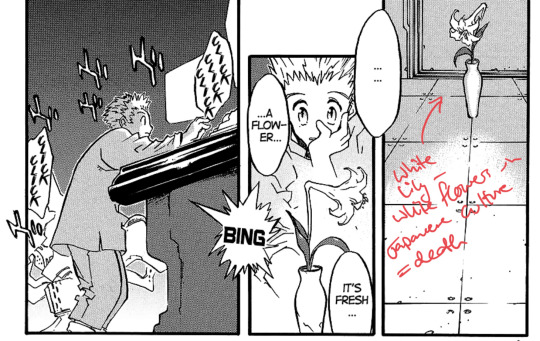
White flowers are a common Japanese symbol for death/grief and are primarily used in funerals. Lilies can symbolize purity and innocence (don't quote me on this one though). Rem must have put that flower there and kept it alive. She does say that she opposed the experimentation and regrets Tesla's suffering and death, but this drives the point home in a way that also highlights Rem's character and her love for flowers (which, tbh, seems more of a Tristamp thing I think? Regardless, I hope the next season of Stampede has more Tesla flashbacks with the white lily. That would be a nice nod to the manga).
Back to Tesla trauma. God, it makes me sick. The cold, detached way in which she's described as the "subject" hits home for me because I have to write like that for a living working in healthcare. It's commonplace and required, but man, it's terrifying reading it and understanding that there's 0 compassion in there. Medical ethics (or lack thereof) are my kryptonite. It gets me every time.
To make things worse, it's gory in it's own sterile way. Tesla's body is contained in nice little tanks, but if you look into those tanks... oof. She's riddled with tumors, organs are near-indistinguishable, and her small little child legs make it all the more horrifying. That's a child. With a detached, tiny baby angel arm in another tank. It may be important to note that this is reminiscent of Vash's angel arm (it's the right arm) but also it's the arm that's detached (well, both of Tesla's are, but this one was likely removed first and by Dr. Conrad and the team). Foreshadowing, in a weird way? And Tesla's entire brain is in another tank, with her eye. At what point did this happen? Was she still conscious for that? I want to scream.
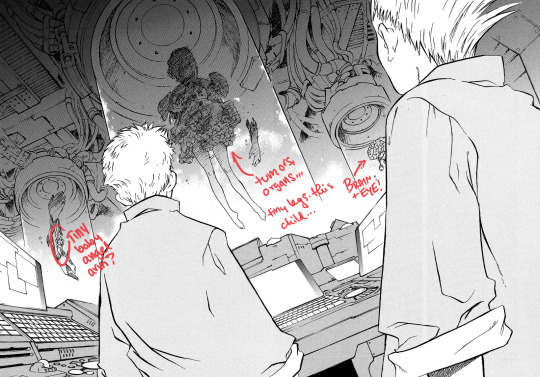
Vash is not handling this well. He's the first to cry out about the differences between plants and humans. Also, the composition of that last panel here is incredible - the emotion is palpable. And the eyes?? Eyes of all the humans, watching them as they sleep in the ship, waiting to pounch, or Tesla's eyes, watching from the tank, casting judgement down? Either way, it's evocative. Poor baby Vash. He is so so angry and so scared.

Knives, meanwhile, shatters so badly that he blocks it out and/or represses it without showing a single emotion - as a defense mechanism. This certainly seems more like a Vash-style response, right?
Do remember that these boys are twins. Despite all their differences that have baked in as adults now, they were much more similar as kids. The specific circumstances in their experience immediately post-Tesla then shape them for the rest of their lives and cause the rift between them that we see today (in the same volume, no less). It's nothing but pure tragedy.
Which then brings us to the next scene - Vash, even at such a young age, is already showing tendencies of self-harm and suicidal ideation. He's refusing to eat, wasting away. He'd rather die than live long enough to become another experiment, to be subjected to that torture. There is no safe place for him in this world of humans, and Knives is refusing to acknowledge it (he's literally asleep during this; we love an avoidant king - jk but i'm handshaking w/ Knives; relatable). Rem, bless her, tries to treat Vash to some freshly-cut fruit (also a symbol of familial love in Japan - acts of service and all) but ya know, she forgets the cardinal rule when handling someone who is suicidal - don't let them have access to sharp objects. No knives for you, Vash.
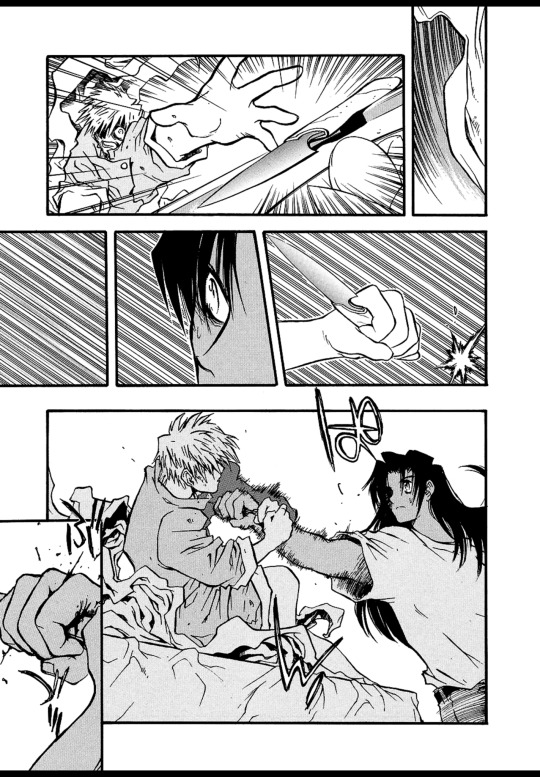
BIG MOM MOMENT. Rem grabs the sharp edge of the blade and lets it cut her to prevent Vash from harming himself. She may not have birthed these boys, but damn if she isn't their mother in every other way. (also, quick point - generational trauma - Rem's grief over Alex's death becomes Vash's grief over Rem's death? I don't have good formed thoughts on this yet).

UGH. The flip side of Rem's blank ticket philosophy - the future is blank, so why throw the present away? There's always, always hope. Isn't that just the overarching message of Trigun?
This is obviously a formative moment for Vash. He never forgets this lesson.
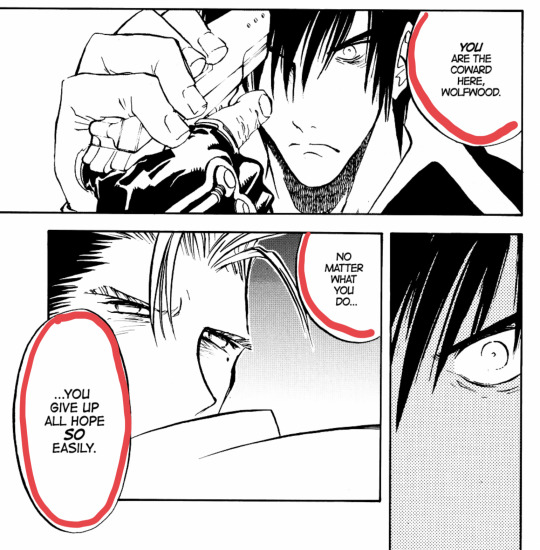
Caveat to this, Vash is still a very self-destructive character as an adult, verging on suicidal without being outrightly so. He has let this moment shape his character, but he still others himself in that he believes this philosophy doesn't apply to him, an Independent. Vash has said before that there's no hope for him, he wishes he had never been born, and he's only really alive to destroy Knives and finish what they started. That's uh, Not Good... what will make Vash want to finally live? (*shhhhh, spoilers!*) Anyway, Vash applies this lesson to Wolfwood in Wolfwood's weakest moment. Vash sees himself in Wolfwood in the "Shoot" moment, no doubt, he sees his fear and anger, even if it's a bit of a different flavor. Wolfwood is simultaneously suicidal in that moment and has this twisted logic of, If Vash can kill me he can kill anyone; this will help him and i'm willing to die for that cause.
Someone tell me their thoughts on this parallel. I kinda just want to scream incoherently about it. That's all I got.
Anyway.
It takes some extra learning in this moment before Vash can figure his shit out. He takes the situation from bad to worse - he's still angry at humans for his pain, still terrified. He's so angry that he stabs Rem - his mother figure, the only person other than Knives that he's ever known and trusted - and instantly regrets it, terrified that he'll lose her (before his worst fears are later realized, and he does and it's his fault, again).
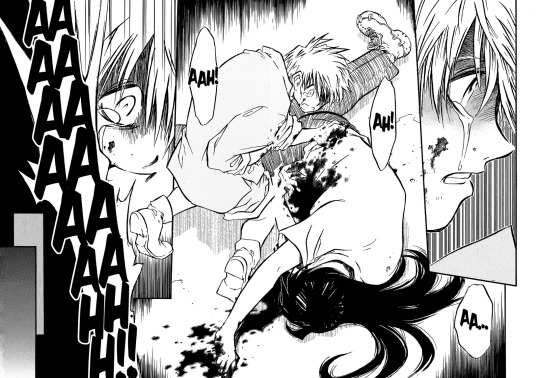
It's like, you know, the feeling when you hurt your sibling because you're so fucking mad at them, but the moment they're actually hurt, you're instantly filled with fear and regret? (THIS WILL COME INTO PLAY LATER TOO I PROMISE.)
I can imagine it's 10 times worse with a parent.
And Knives is asleep! For all of this! I think the one big takeaway with the twins is that Vash has always been the more outwardly emotional one, and Knives has always been more sensitive but withdrawn. Vash expresses his anger outwardly, getting it out quickly, even if it's very destructive in the moment. But this moment teaches him to do otherwise - he sees the result of his anger, and he's terrified out of doing anything to cause harm ever again. Vash tries to kill Rem! Vash, who now wouldn't hurt a soul, even if he wants to! He's terrified of the consequences, and with the added idolization of Rem's memory... yeah. So as an adult, Vash turns away from "flight" and into "fawn" as his main trauma response. He just wants to make things right and he's willing to break a hundred times for it so no one else has to get hurt. (he's also very much a "flight" still, but ya know)
Knives sits back, represses, plots until his emotions have twisted beyond recognition and his resulting actions are a hundred times more irrational and fucked up. Very much "fight". And it's even more terrifying, actually.
When Knives wakes up, he's calm. He's collected. He says he doesn't remember what happened. He's plotting to doom the whole SEEDS project. He's going to kill them all, and he's not showing a single emotion until he's gleefully realized his plan is working. That's horrifying.
I think this is where I'll stop for now. I'm not a therapist or psychiatrist or expert in trauma in any way and this post is quickly running away from me and into a psychoanalysis of the twins, which I just don't feel equipped to do here, never mind have the right words for. But at least this can get a conversation started.
142 notes
·
View notes
Text
hey uh I left a headcanon of Taranza I have under the cut if you wanna read it
Despite what he lets people believe, Taranza isn’t as fond of Kirby as people think. In fact, you could argue that he’s one of the Dream Friends that’s the least fond of Kirby ( not THE least, though- since people like Dark Meta Knight exist ) inside his own mind.
“Why is that?” you may ask? Well, the answer is pretty obvious.
After the events of Triple Deluxe, while he grew grief for Sectonia after her death, he also grew a… “loathing” for Kirby after he realized “Wait a second, I was forced to help this so-called hero in helping in murdering my own friend!” which, I don’t need to tell you, is a way to guarantee someone doesn’t forgive you, even if for the greater good ( unless said friend did something irredeemable which I’m too lazy to name some examples ). Sure, he did realize his actions of blindly following Sectonia’s rule were pretty stupid, but even then it’d be unrealistic for him ( at least to me ) to not have at least SOME loathing for Kirby after all of… that-
Though, the reason he isn’t open about this is because he knew if he was fully and openly honest about his feelings towards the pink puffball, his ass would get outcasted and hated into oblivion. After all, all these common folk only see him hating the oh-so golden child, perfect hero of Popstar for indirectly making him kill a tyrant that was trying to essentially fuck up people on a planet wide scale.
I imagine this would also make him one of the Dream Friends that would be the… more terrifying when severely pissed off. Before Triple Deluxe, he was REALLY hard to piss off badly, but after? While still hard to piss off in most circumstances, be careful not to openly speak ill about Sectonia in some major not-just-petty way or make fun of her, because if a Post-Triple Deluxe Taranza hears you then oh boy, if you don’t apologize afterward, then the authorities will only have your teeth to identify you by.
Trust me, a certain jester with a red and blue hat learned this the hard way ( dw Marx ain’t dead, he’s just seen shit ).
Also, as a very quick clarification- yes, I know Susie was also basically forced to help Kirby killed someone dear to her ( in this case her father ), but that is a different story for another day. Plus, I don’t think she’d loath Kirby as much compared to Taranza in this case due to different circumstances- specifically higher stakes ( Star Dream threatening to wipe out several planets worth of people while Flowered Sectonia could literally only wipe out ONE planet worth of people if she chose to ) and the general fact that Haltmann WOULDN’T have been killed if he didn’t try to use Star Dream in that specific moment ( which at that point he was already a goner ). Just felt the need to say that quickly in case people commented on it.
Some parts of this may be quite a stretch, but I just personally like believing Taranza having a bunch of bottled up anger regarding a dang circle.
Anyways, hope you enjoyed my headcanon info dump.
24 notes
·
View notes
Text
@honorhearted {x}
The memory of that twilight spent beneath the apple trees as the blood-red leaves caught fire in the dying sunlight was as lucid as if it had been yesterday. It'd be a lie if Kitty said she didn't think of the way Ben had looked at her as they explored each other's bodies in such a novice manner that evening before he'd set off to begin teaching in, where had it been, Litchfield? Every year at the peak of Autumn she was reminded of him and his laugh.
The man that departed from her the next morning had not been the same one she'd grown up with, though the fact that they'd been so close throughout the years was probably why she'd trusted him with such an intimate task.
"Despite my better judgment, yes, I suppose I did...somehow."
As her nickname left his lips, she beamed with a feline-esque shine in her eyes and scrunched nose as she socked him playfully in the arm, "Good answer, Benji. You still remember how to avoid me literally twisting your arm."

Kitty bounded beside him, relieved to have something rather pleasant to focus on after all the upset over the past several days. Uncle Lucas' death had hit hard after all the time she'd spent taking care of him, but she could hardly blame Ben for it. After all, how was she to know that it was under Ben's watch that bastard Simcoe hadn't been executed as he should have been?
"Those that believe that complete horse shite don't know you at all," she practically snorted, "I can't imagine your General Muchness was too pleased you dropped everything to come to our aid, but you did, and there are several families that are grateful for it. Even Lucas would be damned proud of your efforts, God rest his soul."
Preferring not to linger on her grief, she slapped him on the back, "As far as rough living goes, you seem to be doing well for yourself. Look at you dressed in all this pomp and circumstance. You must be pretty important."
86 notes
·
View notes
Note
While I wish the show focused on RWBY and get side/secondary characters tf out of the spotlight, I can't help but personally find Jaune more interesting atm. It probably won't happen, but it'd be so interesting to see Jaune return home as he is and face his family. How would his dynamics change with his sisters now that he's the oldest? Is he now older than his own parents? How would they grieve not being able to witness even parts of his life? Would they be proud to know he's "lived up" to the line of warriors, and his parents don't have to wait to see him at his "best?" With the show having tone issues and putting comedy in objectively horrific circumstances, would Jaune jokingly flaunt his new maturity over his sisters? This is idea has so much potential that of course won't get developed or resolved satisfactory, as nothing in this show does. It's not even being done well with the immediately available characters.
Honestly... yeah. While I completely get why many fans dislike Jaune due to his meta problems (and why they might simply dislike him as a character, period) for me the result of giving him so much that should have gone to Ruby means that he's a more well-rounded character and, thus, more interesting to some viewers. Jaune has conflict to engage with. Just off the top of my head:
He's a classic underdog whereas Ruby's prodigy status means she's never really had to improve across the series. Even her one new skill, Silver Eyes, is mastered in a single fight.
Instead, Ruby's problem is that she's younger than her peers which has an impact for... three episodes? Especially since Weiss' issues with Ruby being leader seem to stem entirely from the fact that she wants to be leader, not because she's two years younger.
So Ruby gets a short arc about figuring out how to lead... which is what Jaune goes through too because he's also a leader.
Alongside this, Jaune gets a whole bullying arc that helps develop his character (even if it's pretty simplistic development).
Jaune is the love interest of Pyrrha who spends a ton of time with her whereas Ruby is just the kinda-friend whose relationship exists almost entirely off screen. Seriously, I know we all like to talk about how traumatizing seeing her die was for Ruby (and undoubtedly it was), but her "PYRRHA!" at the Vytal festival is the one friend-y moment I can think of off the top of my head.
Jaune accompanies Ruby on her Cinder quest, ensuring he's there to experience and grapple with everything our protagonist is experiencing and grappling with too.
He gets the armor upgrade and later new gadgets, despite Ruby supposedly being a weapons nerd.
As fans have pointed out in regards to the "Who is responsible for their failed plan?" debate, Jaune gets to come up with a lot of ideas across the series (good and bad) that Ruby then agrees to follow. Ruby was GREAT at coming up with cool combat strategies and plans at the start of the show and now that's all but disappeared.
Jaune has the extreme reaction to learning about Ozpin's secrets. I mean, I hate it, but I can't deny that it's more engaging than Ruby's reassurances that are immediately undermined by Qrow.
Jaune, Ren, and Yang are off LITERALLY FIGHTING SALEM AND NOT SAVING OSCAR'S LIFE while Ruby sits in a mansion drinking tea.
He's the one to kill Penny. Ruby might also have a grief arc this Volume, but that's lessened by the fact that it should have occurred six Volumes go and she only heard about this second-hand. That's a COMPLETELY different scenario from not just seeing the death, but causing it.
Jaune winds up in Ever After and immediately finds the contrived plot device that makes his life - as you've laid out, anon, - that much more interesting.
Ruby has a breakdown about how bad things are and so does Jaune... but to my mind he's got a lot more to complain about with a lot less responsibility too, so it resonates with me more. I mean, I don't really want to compare trauma - Ruby obviously has a LOT to be upset over - but I struggle to hone in on her "I hate having to cheer everyone up!" meltdown when Jaune is there having a "I've been alone for decades and now my village is dead!" meltdown.
And yeah, we can throw in a lot of Ruby specific things too. Sort of. She has Silver Eyes! ... which haven't been very important in the narrative and, you know, Jaune is the descendant of some great huntsmen family with hints that he'll be even more by the series' end. Ruby was targeted for kidnapping! ... once, while Jaune was there helping to defend her, and it's not something she ever reflects on. Ruby is the simple soul destined to save Remnant! ... and Jaune is now the Rusted Knight, a literal fairy tale hero who, as we've been reminded over and over this Volume, everyone in Remnant simply adores.
None of these are new complaints. Jaune gets too much screen time. He gets too much development compared to the girls. He's too perfect despite supposedly being a fuck-up at the start. No one who came to RWBY for the woman-led team focus is happy about this (or about Ozpin-Oscar being at the center of this fight). But the inevitable result of all that - if you can get past your frustration - is that Jaune is simply more interesting in a whole lot of ways. He's developed more across the series and now continues to have more engaging, logical conflicts. Jaune has lived a lifetime in a fairy tale and faces the possibility of returning to Remnant with an insane amount of baggage to overcome, to say nothing of how this would change how everyone interacts with him for the rest of the series. He still has a personal beef against the villains for Pyrrha's death whereas we haven't confirmed that Salem killed Summer, or that Ruby wants to hunt her down for that. Jaune is now falling apart for very legitimate, understandable reasons that none of us really need to nitpick because yeah, who wouldn't have a meltdown about spending decades in this place and then loosing a whole family? Meanwhile, Ruby is... sad about a death that already happened once and also that she "has" to be leader after demanding to be leader. One of these arcs is not like the other!! The fact that Ruby does have interesting things for the story to engage with - the mysterious death of her mother, the potential for her Silver Eyes to be the only thing that could hurt Salem, etc. - doesn't matter because the story isn't writing that. So yeah, hard agree, anon. The story is supposed to be about Ruby, I want it to be about Ruby, but the show continually goes, "Look at this more interesting, more developed, more conflict-laden character over here." Even if RWBY fails to do something good with all that - which inevitably it will - the potential is still more engaging than 99% of what Ruby has had going on since Volume 5.
56 notes
·
View notes
Note
it's amazing derek's functioning in s1.//
His sister was killed. Killed by his uncle. Who was the feral alpha. That bite a teenager. And there was Kate, who shot him and torture him.
And yet, he never try to take revenge. Is incredible that after all that. He really tried to do his best. He called Scott brother, he tried to make Scott trust him. He try to save him. When he was mad a Scott teen crush, he was seeing himself with Paige.
He wasn't the best communicating. But he tried.
He never used other or try to make them do something that they didn't want to. But Scott, he made Derek to bite Gerard. When Derek told him that the bite was a gift.
Scott is not a saint.
derek hale is probably one of the most traumatized characters to grace television and that's before we're introduced to him. i don't think derek had a break in life since before paige's death and he'd been existing in survival/crisis mode for years by wolf moon.
i'm of the mind that derek didn't receive the proper support he needed after having to mercy kill paige. which was an act of compassion to minimize her suffering a drawn out painful death. however, due to the circumstances her true cause of death had to be covered up and along with it derek's grief surrounding not just her dying but his participation in it.
this is what kate argent took advantage of to get close to derek. i think it's reasonable to assume that the substitute teacher angle can still be considered valid. we know the argents use this tactic and it was used in the on fire novel.
her being a sub would've put kate in position of trust and authority over him not to mention paige's death would be recent enough for her to easily find out about it as well as derek's connection to paige.
in fact, i think it was paige's death that was the impetus for kate even being in beacon hills but i digress.
all the adults in derek's life failed him.
the thing about derek hale is that never gives up and he never stays down despite the things life has thrown at him. he learns, he changes and he evolves as a person.
when scott and derek meet in wolf moon it's the worst possible time for them both and that impression is what lingers between them. derek's has a hard time not seeing scott as a reflection of his younger self and derek is so, so, so viscerally angry with teenage derek. it compounds when he believes scott is making the same mistakes he did.
scott, of course, responds to derek with bullheaded stubbornness because not only is scott a super independent person but he reacts very badly to male authority figures who want to exert any form of control over him.
rafe mccall is a piece of shit and i will stand by that. there is no one incident when your parent is an alcoholic but maybe it's my own personal bias showing. it's just hard to believe rafe only did something once especially when the supposed only incident is a grown man grabbing a small child with enough force that when the child resists they fall down the stairs resulting in losing consciousness.
the show makes it's clear melissa and rafe argued frequently and loudly, that melissa believes they're better without him. that says abusive household. hell, the man also seemingly checked out of his son's life for years and with the money issues the mccall's are shown to have does he even pay child support?
scott responds negatively to not just villains like peter, gerard, and duecalion but to also to normal power tripping mr. harris. his relationship with chris argent gets development so scott eventually respects him but it takes time and allison literally dying.
there's also the fact derek is not more than a few years older than him so scott does see derek as more of a peer throwing his weight around than he sees an adult with authority. derek using the "we're brothers now" line on scott triggered him and frankly derek it's a weird thing to put in your welcome speech. it's trying to inorganically force a relationship that isn't on that level. it's why it's both funny and sad when scott uses the line later on liam and stiles cringes so hard his soul leaves his body.
the only two male figures scott carries respect for throughout the show is sheriff stilinski and dr deaton. which is why it's so easy for deaton to get scott to go along with his plan in s2 without him thinking the repercussions entirely though.
don't misunderstand me scott's double cross in s2 is terrible but i think people forget deaton's role in it sometimes. there's a reason stiles wasn't in the loop on it like nearly every other plan scott does. i wish the narrative put more weight on it but i'm not surprised it was glossed over as teen wolf keeps everything snappy and fast paced. we don't frequently get time to dwell on things which is a shame because it could've provided interesting development.
if anyone tries to make scott a saint than they're lying but also the opposite is true. scott isn't evil like some fans seem to want him to be.
derek and scott's relationship is never straight forward and always complicated. they're both shitty to each for reasons due to their respective histories that the other has no way of knowing at the start.
but also like it's not teen wolf if there's not a failure to communicate to drag the plot out.
29 notes
·
View notes
Text


Allow me to be unhinged on main and finally write the post where I break down Tar's lore and how I interpret it. It's most certainly not cannon, but it's how I view and write my Tarhos until we actually get things that talk about him as a person. Something something there's a joke here about me not having reading comprehension and it's okay to disagree.

Part one: His Store Page Lore
I’m going to start with the lore on his profile. It’s quite a long read as he’s from the era where they started transitioning to longer and longer backgrounds for both survivors and killers, but inside of it there’s not actually much of substance. I mean… what does it actually tell us about Tarhos as a person? Let’s dive into it.

“ Tarhos K.ovács didn’t remember much about his childhood, but what he did remember he would chase his entire life. He remembered the cries and screams in the village. He remembered his mother forcing him to swallow a thick, black fluid like medicine. He remembered collapsing to the hard floor only to awaken in a mass grave, buried under a crush of bodies, with the sound of the village burning in his ears. He remembered pushing, pulling, and climbing to the top of the bloody mass only to be seized by the death, destruction, and silence—the indifferent and impenetrable silence. A high-pitched whine suddenly sounded in his ears and his skin began to prickle as he realised he was in the presence of something he couldn’t possibly understand. And though he couldn’t articulate what he was experiencing, he knew it wasn’t pain, grief, or fear. It was something else. Something closer to— Awe. “

Putting the entire paragraph here since it’s the opening, but Tarhos is already a deeply traumatized man. He was thrown into a pile of bodies that he had to physically claw himself out of as a child, it’s natural for anyone to freeze in that kind of circumstance. There’s also the first hints that he may have already been touched by the entity in there with the line: “ A high-pitched whine suddenly sounded in his ears and his skin began to prickle as he realized he was in the presence of something he couldn’t possibly understand. “ While I don’t necessarily think he was, I think this is just his mind reframing what he saw and experienced as a literal child to cope with what happened to him. Reframing something he never could even begin to understand at that age as him being in awe of what he’s witnessing especially when we get into his later philosophy in life that he talks about in his tome where he thinks life is about violence from your birth til you die.
There’s also the mention of his mother, which put a pin in her; we'll get to that later with his tome. His mother unsuccessfully tried to poison him to save him from the life he would later have which is tragic in itself, but he woke up. He was probably still feeling numb from the effects of whatever she had him drink when he did wake up in that pile which can dull the senses which also can lead to this “awe” like numb feeling that’s described. I don’t think he’s nearly as violent and heartless as keeps getting hammered in over and over again in the text, because it just doesn’t support it at least in his pre-entity life. In fact… we know next to nothing about it. Not even from add ons and in the cosmetics that do talk about it, they say quite the opposite. Most notably his moth cosmetic where he lets a moth go instead of killing it despite looking at it like it’s weak and helpless in his palm.
We know he has restraint. I do also want to call attention to some quotes that still talk about when he’s being shipped off to Italy.

“ He didn’t even react when they carried him off to a horse-drawn buggy and locked him up in a small, wooden cage with other slaves. ”
“ And even as they rode away telling him he was headed for Italy, Tarhos stared through the wooden cracks with eyes wide open and a heart wanting to understand what could not be understood. “

Again. This lack of reaction from a child who is coming back from a near death experience, this to me reads less as him being mesmerized by the situation around him and more like the second quote. He’s trying to understand. That’s the last we get of his childhood even in his tome it just expands a tiny bit on what we already know. There’s no sympathy for him. There’s no mention of anyone pitying him and trying to comfort him. He is just another piece of cargo to be traded and sold. He isn’t human. That feeling can also lead to that sort of dissociation where you’re just a passenger in your own body, not reacting to anything and certainly not being able to even understand what’s going on. I know I keep harping on it, but it’s important. He’s not an evil mastermind who was born that way, he’s a child.
Moving onto the midpoint in his lore where it again doesn’t talk about him as a person, but instead talks about other things. How he belonged to the Guardia Campagnia where he trained under “Kadir Hakam” whose role is literally not stated, but judging how privileged Tarhos is as a slave (he gets granted a literal title of nobility that is “Knight”) I’m going to assume he’s either close to the captain or the captain himself. And I do write him like he is, because as stated Tarhos gets this title that I’ve literally never read about being given to foot soldier slaves, not that it never happened I might not be looking in the right places, but it certainly wasn’t the norm and to grant that title you have to be a member of nobility yourself.
That and it’s unusual to name drop a person and never bring them up again. Usually if someone is named dropped they hold some sort of importance. Regardless, in the same paragraph it mentions Tarhos learned how to fight, forge weapons, repeat a code of chivalry and obey whoever employed him obediently. This is probably where his hatred for authority comes from. In his tome he talks about how he hates people that are cowards. People who lie to themselves about what they’re doing to justify it, he says that he’s been raised around knights and lords his entire life and they’re all that way. He despises them, but we’ll get to that in a bit. This is backed up by his normal lore where in his own eyes he sees other mercenaries, probably free men, as hostile and competitive only finding a small friend group in the faithful three who see him as their ticket to freedom. These are the only people Tarhos seemingly trusts and some of the only people he later comes back for.

“ Years passed. Blood flowed. And yet, all that killing still didn’t bring Tarhos closer to what he had experienced in his village. Nevertheless, for his bravery in battle, Tarhos was granted knighthood and freedom. The Hungarian slave was now liberated, his brutality rewarded, though his heart still longed for something else — something he could not name or describe. “

I do want to point out how he was granted knighthood for his bravery in battle immediately followed up with it being a reward for his brutality. Not that they’re opposites, no, it’s just odd when we’ve never been told anything about him being brutal in his campaigns or mercenary work before. Just again with the faithful three, him being courageous and efficient in battle. You’d think for someone whose so evil and brutal and obsessed with death what he’s done a majority of his life would be talked about more, no? Why would it only be brought up now when he’s free? Bhvr writing aside, Tarhos takes no pleasure in what he does. His heart still longs for the silence and awe that he experienced in his childhood, he’s never gotten that from what he’s done despite being in probably countless similar situations.
This is when Tarhos takes up his long contract with Vittorio that’s just escorting him on his hunt for relics so he can get the money to buy his friend’s contracts out. While we don’t know anything really that happened on that expedition we do know it wasn’t something short. This is the medieval period. They’re traveling by horseback, foot, and boat that often requires you to follow waterways just to keep your horses hydrated, especially with Vittorio being nobility he’d want to keep them well conditioned as they’d be high quality. This made them travel no matter what even if he met him in Vittorio’s town from Italy to France, crossing mountains into Spain, and into Portugal. That is not a short trip. It is utterly insane to have no info on this massive part of both their meetings, but with how long they were together and the artifacts Vittorio was searching for being relics to summon the Entity.
This brings us to the very important question that I honestly cannot answer. That is, how much is it him utterly despising Vittorio for something that happened on that trip and how much of it is Entity influence that we see with all the killers? The truth is probably somewhere in the middle, but we do know from his tome that Tarhos does hate him. Again we don’t know for what exactly. If it’s just him being a coward in his eyes, him being nobility or something that happened, there is no info on it, not even an add-on talks about it. Which I will constantly complain about until we get even a cosmetic that talks about it, because it's such a massive piece of his lore that not even his tome touches on. Back to what we do know, we do know being told to “find another way” sets him off to kill the native people guarding the catacombs and grab the Lapis Paradisus. After he gets the entity, summoning stone is the only point in his lore and tomb that we ever read about him being unnecessarily cruel and brutal.
This is where we get him imprisoning Vittorio in his own dungeon, torturing his townsfolk which strengthens the Entity connection to the land, him riding on the Guardia Compagnia and killing everyone except for the faithful three, and then coming back and torturing Vittorio psychologically to try and figure out what’s so important about the stone. Then the Entity scoops him up after lords raid the town calling Tarhos “the embodiment of evil”. This is what I talk about when it comes to his written lore where it’s very “I want to have my cake and eat it too”. He is this violent and brutal man who's done so much, trust me guys, but the only times it’s ever written about him being unnecessarily cruel and evil it’s when the Entity is already in his head and I think his tome only further exacerbates it. I also find it really funny that his store lore brings this great importance that Tarhos is torturing Vittorio, because he won’t tell him what the artifacts are for, but that gets completely lost in his tome. Speaking of which—

Part 2: His Tome
So I’m going to say the most obvious thing people have pointed out about it: it is literally his store page lore. I’m not going to go over the narrative beats of it like I did in part one, I’m just going to talk about what I find extraordinarily interesting about it, because unlike his store page lore, we actually get insights into Tarhos as a person and what his ideals are. Memory 151 is all about the first part of his lore except it puts greater emphasis on how much he respects and cares for his mother and puts even greater context as to why he is so calm waking up in a body pile:

“ His father fighting outside. His mother preparing something on the small wooden table. The screams rise to a crescendo. He stares at his mother. No concern. No panic. No fear. Her face is hard and determined as she prepares a thick black elixir that she says will help them sleep through the madness. She is their strength. She is his strength. He has never seen her in this way and he feels safe despite the chaos and carnage outside their small, thatched home. “
“ She turns to Tarhos with a reassuring nod. She helps him drink his share and tells him everything will be as it is supposed to be. Bitter and thick, the elixir oozes down his throat as the cries and screams and clangs rise and fall outside. Then he feels it. The numbness spreads from his lips to his feet. Faces blur. Sounds fade. And an inky blackness spreads over his eyes as he falls asleep in his mother’s warm embrace. Then there is silence. “

Tarhos’s most fond and only memories of his childhood are of his mother and this poison that she fed him. This does come up again, but it’s important to say that she made him feel safe. His father is only a footnote, he never gets brought up again, but his mother does. Safe to say how she made him feel before he passed out is why he woke up so calm and collected despite waking up in a body pile and staring at his uncle's dead face. This is further supported by:

“ Tarhos knows he should be scared. He knows he should feel sad, but he doesn’t. And he knows he should feel guilty for not feeling sad, but he doesn’t. What he feels he doesn’t understand or cannot put to words. He just stares at the horror before him without flinching. “

He knows what he should be feeling, but he’s just numb. He’s calm and numb just staring out in wonder over what happened to the village he grew up in. Now we don’t know how old Tarhos was when he was taken, but the typical squire at the time tended to start their apprenticeship at age 12 and going by how he grew up into having the skills for knighthood, he probably was around that age to be able to learn those skills if not maybe a year or two younger. He wouldn’t be able to process something like that happening to him, especially not with poison in his system numbing everything. And again you have to remember this is a memory re-contextualized by how he feels about life now. He is constantly searching for that numb feeling, the quiet with the ringing in his ears where he can just bask in wonder. He never got that working for the Guardia Compagnia. It states it pretty clearly in his storage page lore.
Memory 152 is him traveling through the mountains of Portugal, so this is literally just the final few paragraphs of his lore. Nothing about him when he first got the contract. Nothing about when he started, nothing about the faithful three or his time as a slave. No mentions of how brutal and “evil” he was, truth be told I don’t think Vittorio would’ve hired him given his own ideals if Tarhos was really as evil as they try to hammer it in that he was. I don’t get why if they keep harping on him being this insane and brutal man who was cruel to be cruel why don't they show it? Don’t tell me he is. Show me he is otherwise those words mean literally nothing and are just how others perceive him while also contradicting others calling him brave and courageous which are both very positive traits.
It's also kind of really funny that his tome contradicts his lore again in that Tarhos knows what the relics are for, but I’m going to combine that quote in a block with the ones about his own personal philosophy, because I want to talk about them both together:

“ Lord Toscano claims he isn’t after riches, but hope. Hope that this stone can lead him to another world that holds knowledge that can save this one. He prays that this lost knowledge of the ancient guardians might bring peace, harmony, and order to a world plagued by cruelty, violence and imbalance. Tarhos scoffs at the idea of a world without violence. Life is violence, from birth to death, and everything in between is a futile attempt by cowards to hide from the horror that is living. The only plague in this world are the lies, the unnatural codes and laws created by nobles and lords for their mutual benefit. Unnatural laws and codes and books that deny the truth of the world by trying to make it something it's not. “
“ Tarhos believes something else. It's all good, or none of it is. It’s all evil, or none of it is. It’s all part of the same cosmic mud—the mystery that transcends the world and all its dualities. A mystery he never pretended to understand but affirmed all his life with his sword and his disdain of those who used their laws to make their slaughter pious. Hypocrites, all of them. Not him. There’s no guilt, no shame, and no need to hide from life. ”

Why would Tarhos hate the laws and codes that enable the violence that he allowed to commit and uphold his life philosophy if he is this violent and cruel to be cruel man? Time and time again where he is supposed to be this “embodiment of evil” is contradicted not only by his own words, but also by what’s written about him. He hates the church, he hates chivalry, he hates everything that is used to justify violence and human suffering, because they’re all trying to shelter themselves from what their lives are. Tarhos has experienced “nothing but darkness” his entire life. The earliest memories he has are of his mother trying to poison him to keep him out of that life and watching his childhood village being burned to the ground. His entire life he’s been treated as nothing, but another animal.
He is a slave. He isn’t a person with bodily autonomy, he had to learn to be obedient to the nobility he hates and swallow the codes that justify their human atrocity. He thinks Vittorio is an idiot. Another naive man who wants to change how the world works.
Memory 153 is where we really see Tarhos “snap”, but it makes sense for someone in his position and again, we literally have no idea if this is a build up of things happening over and over or if it’s just random. Just going by how he already seems to hate Vittorio more than other nobles he’s been around, I’m going to assume it was a buildup of things. Probably him talking about his pacifist world view and his goals of “hope” and “good for humanity” that Tarhos genuinely doesn;t see value in. He hates it:

“ Find another way! Disgust strikes him like a sword. He feels the blade pierce his chest, smacking the breath from his lungs. He has no words for this order. All he can do is stare defiantly. Find another way? Why? So Toscano can sleep at night? So he can waste more of his time with his foolish notions of right and wrong, of good and evil, of noble and barbaric. Toscano’s entire fortune was secured with violence and slaughter justified by highly imaginative codes and laws. His fortune was secured with nothing but darkness. Tarhos grinds his teeth as disgust darkens toward hate.
And he feels something else. “
“ He’ll take his stone and his relics and his town, and he’ll show this bloody coward the truth of the world—the truth that has always lived in his heart. And no one will stop him. Not the guards in the village, and certainly not the three knights Toscano left behind. Without hesitation, Tarhos dismounts his horse and unsheathes his sword with a terrible ring. “

Tarhos is a free man who is just trying to earn money to buy out his only real friends he has contracts with. He has been riding through all of Europe for months. The last thing they need, the entire point of him going on this trip is right there and now Vittorio wants to “find another way”? I’d be mad too. It’s understandable for Tarhos to be upset given his own world view and how long he’s been traveling. I know bhvr is allergic to even trying to put it into perspective for how long he would’ve been traveling but it probably would’ve been 6+ months depending on where they started in Italy and how they traveled to France, into the mountains to Spain and then across Spain into Portugal. That is a lot of traveling and depending on when they left it could be in less than ideal conditions especially once you get into mountains.
And this is something Tarhos doesn’t even care about. It’s just another job to him just to get money for something else. He does not care about Vittorio’s goals. He thinks they’re stupid and who knows what else Vittorio has been saying on their trip that drives him up a wall when he hates nobility to begin with. But I also want to highlight the important note that can easily be brushed over. “He feels something else.” To me this is when the Entity really gets her claws in him, we know she does this with most killers to influence them. We know that’s why Rin’s dad randomly snapped and killed her family as stated by the devs he was originally the target of the Entity before it took her instead. Tarhos I don’t think is like a Trickster or a Ghostface.
He doesn’t actively enjoy the violence he commits like they do, it’s just a part of life to him. Violence is part of living and he has to make money to live and to make money he has to kill for other nobility who hide behind laws and codes to justify the atrocities they have others commit in their name. Also after this point is the only time we ever get actually shown him being cruel and unusual. This is when he starts torturing people and mutilating innocent people’s bodies in accordance with the book Vittorio had. The beginning statement isn’t cruel and unusual, it is him being upset at everything he has hated before, it only became cruel and unusual after he “felt something else”.
Memory 154 - 156 is just him killing the people guarding the catacombs, not all that important, but he’s not being extremely cruel there either. He’s just efficient. What we’ve already been told in his normal lore, so I won’t talk about it took much. Memory 157 is a bit more interesting, but not much to talk about besides it being more clear evidence that the Entity has some sort of effect on his life at this point. It allows him to evade death blows and kill the knights that he really shouldn’t be able to. Vittorio steps in and hands himself over to Tarhos to stop any more violence that kind of thing. 157 is just more of him killing people for the most part, they dedicated way too much to it, but you know. Memory 158 is him psychologically torturing Vittorio, nothing too interesting other than him wanting to open the passage to the “perfect world” Vittorio kept speaking about, but only, because he thinks it's just a world free from the lies and pretenses of civilization. Interesting to note that unlike his store page lore, he knows what Vittorio’s relics do, he’s just torturing him to find out where he hid the rest.
But memories 159 and 160 are extremely interesting. It’s where we get Tarhos monologuing and lamenting to Vittorio about his life and what he does. Lots of quotes coming up, because these two memories are why I love his tome:

159:
“ The nobles are preparing to attack me. And why? Because I am doing what they do, only without the lies. They say… they say I am mad.
Tarhos scoffs.
Do I seem mad to you? Life is madness, and I accept it for what it is, and so perhaps in that way I am mad.
Tarhos opens the door, enters slowly, and crushes several maggots as he paces around the small dungeon.
I remember a village we destroyed because a man had stolen food from a noble. The entire village in ruins and everyone hacked to pieces because of a few stolen apples. So much suffering and death because of one man’s hunger and another man’s ego. That's the history of the world right there.
Tarhos fixes his gaze on Toscano who says nothing.
I didn't mind the killing. But I did mind the praise and honours we were given for our just and pious deeds. That kind of talk is true madness. “
160:
“Paradise will come when you make peace with life as it is and not the way you imagine it should be. When you embrace the horror instead of running from it. Only when you can do this will you see the madness of your ways. Your futile search for knowledge. Your foolish refusal to take a life — even the life of a grovelling maggot.”
“There was a village quite far from here. A small army advanced on this village on a mission, I suppose, to butcher the barbarians… to make this world a better place. Rather than be killed by a stranger or be taken as a slave these villagers had chosen to die by their own accord.
Tarhos scoops a few more maggots and tosses them into the mouth.
I remember one mother had poisoned her family without hesitation or remorse. The love and strength of will it must have taken to do that is something I’ve yet to see in all my experiences on the battlefield and off. I have been around nobles and knights my whole life and all I’ve seen is cowardice steeped in the rotten stew of lies and hypocrisy.
Tarhos tosses one last maggot into the festering mouth, stands upright, walks through a thick cloud of flies, and pauses in the torch-lit doorway.
I have yet to meet her equal.”

There’s a lot to unpack in these two memories. Tarhos doesn’t mind what he does, because he has to. It’s the way life works to him after his entire life being steeped in blood, because he just so happened to be born in the wrong place at the wrong time. You have to become jaded to it or your brain will kill itself with the guilt, but most importantly and in stark contrast to how Bhvr describes him: He doesn’t take pleasure in it. He hates being praised for it. Life to him has been nothing, but violence committed against him and by him, he’s seen the more horrific acts imaginable made pious. He hates it. He hates that he’s being called crazy for doing what other lords and nobles do every week over something as stupid as food being stolen. He also talks about his trauma as if it’s happened to someone else that much is obvious.
He’s clearly talking about what his mother did for him and sort of implying that his mother was brave for trying to save him from the life he has now. It’s clear that those memories are the only comfort he really has and that’s why he had to reframe his own trauma to make his existence bearable. No one can blame him for that, but I also don’t think he’s this overly cruel monster Bhvr and others try painting him as. We just don’t see anything aside from when the Entity is already in his head that was overly cruel or inhumane on his part. He is from the early 1400s. Life back then was incredibly violent and death permeated everything. Infant and child mortality were so high it knocked the life expectancy statistics down to you’d die at 35. Lords and nobles were constantly squabbling with each other on who owed who what. Blinding was a common form of punishment for prisoners of war to the point where people were bartering with it.
You cannot say anything that we’ve been shown currently is any bit more violent and cruel than what was normal for the time until we get to when the Entity starts influencing him.

So how does this impact how I write my Tarhos? Well- I take his lore as him being a deeply traumatized man who normalized everything that he's done and has happened to him as a coping mechanism to just be able to have a semblance of happiness. Violence is a coping mechanism for him, he is constantly chasing that feeling of being half dead and numb to the world, but he can’t ever achieve it. The battlefield was the only place he ever got close to feeling it, it was the only place where he was let off his leash and allowed to do what he wanted. It was kill or be killed, so why feel guilty about what needs to be done? He’s very apathetic to human suffering. He’s not going to stand defiant against a lord or noble who wants him to cut off a child thief's hand and he’s definitely not going to bat an eye watching it when he’s not on duty. It’s the way life works. Life is violence. You can never be free of it and trying to justify it and treat human atrocity like it can be morally pure is utterly stupid to him.
I think especially in his childhood he was still half-dead from the poison he was made to drink and disassociating partly because of what he was witnessing and partly because of it as well. He was a child who couldn’t understand what was happening and since then he has reframed it in his mind as him being happy and in awe of everything. In his adult life he’s very jaded, he’s used to being called a rabid dog, because he’s had to fight to get contracts all his life and thus will take anything. He’d rather be called a rabid dog than have to sit through the praises he’s gotten from others over the atrocities he commits. He’s not a good person. He is well aware of that and there’s no real changing that about him. He is fine with killing, maiming and torturing, because that’s how his life works. He will never meet someone he holds in as high regard as his mother, because she will always be the bravest person he knew for trying to save him from the life he has now. Tarhos has little faith in humanity, but he especially hates nobility and the church. He despises how they’re all built on the blood of innocent people and then they try to justify it with laws and passages to make it righteous. He especially hates Vittorio for being a pacifist. He thinks it’s extremely hypocritical for a man who probably owns serfs and slaves to be a pacifist when he is actively the reason so many people’s lives are awful. His entire fortune was built on the blood of others and now he’s going to choose to be a pacifist and act like he’s better than everyone for it?
He absolutely would horrifically maim and torture Vittorio endlessly even if he doesn’t really remember the exact reasons anymore. Tarhos is a man shaped by his environment and then exploited by the Entity until he starts acting out after realizing the fog isn’t paradise, it's the exact same as everything else outside of it. A bunch of made up codes and laws that justify the suffering happening and the cowards that revel in it.

#ooc#/about the muse#𝘕𝘰𝘵𝘩𝘪𝘯𝘨 𝘉𝘶𝘵 𝘋𝘢𝘳𝘬𝘯𝘦𝘴𝘴 - [ 𝘛𝘢𝘳𝘩𝘰𝘴 ]#hi this is 5.3k words- I'm so sorry WEHRWEHREWH#it probably makes no sense in some points; because I cannot bring my brain to have the motivation to proof-read and edit it#but i love him a very normal and healthy ammount i can be trusted around him
6 notes
·
View notes
Text
falling down (1993) is a movie I frequently think about because it's a film so saturated in racial politics that doesn't end up saying anything about race. it's not even that the movie is milquetoast in it's messages, it's very upfront about everything else, but when it comes to race, it suddenly stops in its tracks and sputters confusingly in a few different directions.
i would say that it's fair to interpret the film as at least a little racist (despite being critical of it's protagonist, it does seem to thoughtlessly regard his beef as legitimate in some ways), but it's inaccurate to insist that the protagonist is presented as a normal guy who goes berserk. he's referred to as D-FENS instead of by an actual name because he is a symbolic representation of mid century american values. he is an ex-defense contractor employee who comes from a patriarchal military family and inflicts abuse upon his wife and daughter (potentially his mother as well) in the tradition of american chauvinism. his sense of identity is rooted in the power that these things afford him, and the film is about him lashing out because he feels that sense of domination waning with the changing times. many people use the scene where he kills the neo nazi as evidence that he isn't actually racist, but the next scene literally uses the nazi flag to frame him as he calls his wife to threaten her! him taking weapons and supplies from the nazi is meant to be indicative of the fact that their ideologies draw from the same well.
what's odd is that the good guys of the film aren't particularly emblematic of any kind of just ideology, they actually kind of exist outside of the paradigm of racial politics that occupy D-FENS' life. I feel as if this creative decision was made as to not make them look unsympathetic by exploring any implications of their profession as cops within a heavily racialized landscape LOL. D-FENS' foil is a white cop whose name I forgot, so i'm just going to call him White Cop. White Cop's grief comes entirely from his white higher ups, who undermine his work ethic, experience and his care for his wife. he communicates normally with the people of colour that D-FENS torments, but is also nonplussed by the swaths of people of colour being treated unfairly by his colleagues (who are also Cops of Colour(CoC if you will)). it's also worth pointing out that D-FENS' wife attempts to reach out to her local police many times for them to do something about her husband, and they respond by repeatedly disregarding her very valid concerns. White Cop punctuates one of the film's main themes by chastising D-FENS for ever believing that the american dream was a real thing, and tells him the most important thing is being good to your family. D-FENS chooses death by cop due to being unable to adapt to this.
the film conveys that modern life is chaotic and unpredictable, it recognizes the relationship between nationalism, fascism and domestic violence, but it completely sidesteps making a statement on race. LA Gangs and The Homeless are simplistically framed as something that just exists that you have to contend with, and while they aren't framed as being equal to racist vigilantism, they also aren't given any kind of depth or roundedness. they arent approached with the same degree of thoughtful curiosity as the film's other components. if D-FENS is at all a victim of circumstance, then so are the people who wrong him throughout the film. gangs just exist like atoms slowly bouncing around without cause or purpose, which leads one to cannot help but wonder about the director truly thinks about them. I wish there were more scenes like the fast food scene.
12 notes
·
View notes
Text
would love to put babalon and duo in a room but he wants her dead. remember how he orchestrated her death? that was fucked up right ?
duo and babs in the main story are very similar when you think about it, the main difference being that babs is entirely aware that she's a cornered animal whereas duo is in denial
like they both cause immense destruction and horrifically manipulate their loved ones because they're both at the point where they don't feel they have any other options, but babalon can admit that and duo can't
yeah like. looking at the way babs manipulates arc and duo manipulates shuichi………
thinking about this still. eye-em-oh babs comes across as more sympathetic than duo on an immediate surface level (bc when you examine it they're both sympathetic despite the downright fucking horrifying things they put their loved ones through), because babalon's vulnerability is plain as day but duo can't admit to any vulnerability. we see babs' affection for arc and how she cherishes being their mother, and even before they die it's explicitly stated that babalon concern for arc outweighs her concern for her plans. so it's evident that babalon loves arc and doesn't want to hurt them and wouldn't be doing so were it not for her being blinded by grief and the circumstances she's in literally driving her insane. but with duo, there's just the barest glimpses of his reluctance (which naturally aren't immediately clear as such), and (not counting his voice lines) his affection for his brother is only shown after he Does All That. so where babs is obviously doing this because she's been pushed to and beyond her limits and even then with a pained conscience and with love still in her heart for the people she's hurting, until you Examine it duo comes across as incredibly callous and uncaring, and very deliberately gives the impression that he just decided to hurt his brother in the most visceral way possible for no particular reason, because if he confronts the fact that he's cornered and out of options, he's just going to mentally implode.
0 notes
Text
My thoughts on What If... Doctor Strange Lost His Heart Instead of His Hands?
The very title of the episode sends a shiver down my spine. And this is where we’re going to start.
~ long post under the cut ~
A year ago, I wrote this post as an attemp to dive into one of the most important traits in Doctor Strange’s personality: love. Stephen is a being made of love, made to love, no matter which interpretation you have when you watch Infinity War. If you don’t read comic books, you’ll understand the moment you meet Donna. You’ll begin to understand how her death reshaped his entire subjectivity out of fear of failing, being powerless and unable to control everything around him (especially death), thus the arrogant and yet a disaster of a man we all know.
Where do I even start? Stephen loved her sister deeply and felt responsible for her death. And then, slowly, he also lost his parents and his brother. He fell in love with Clea but he also pushed her away. He loved Zelma platonically and lied to her, which was enough for them to break their bond. He felt attracted to Kanna but screwed things up, even though they remain friends. He was forced to kill the Ancient One, the only father figure he had ever since his father died. And lastly, the only person who would never leave his side... also left. Yes, even Wong. Stephen has SO much love to give but he’s also afraid because he’s cursed. He truly believes his love in poison. And would you look at that? What If really delivered a story where this is actually true.
What If Doctor Strange Lost His Heart Instead of His Hands?
The level of understanding when it comes to the character is... inconceivable. What could possibly reshape Stephen into following a dark path but love? The very premise of the whole episode. This is so much more than a love letter. This is literally too much, in all senses.
Fine, let’s begin.
What if the best of intentions has very strange consequences?

No. You used the word “strange” for the pun but this is not the word. Nah-ah. I’d go with ATROCIOUS, for starters. Things are gonna escalate so quickly, my friends.
Seriously, tho? Christine is SO SO SO SO beautiful, they’re so cute together. I have this feeling that MCU!Stephen was quite toxic because of his arrogance and this is why they didn’t work out. But WhatIf!Stephen???????? He’s always praising her, teasing her in a healthy way, respecting her and listening to her. HE TRULY LOVES HER, I’M GONNA CRY ALL OVER AGAIN, PLEASE, NOT THE CRÈME BRÛLÉE, PLEASE

I’m going to leave this shot here because we need to go back to it later. Hold that thought.

And bonus points to “Yeah, well, I would call that quite remarkable.” / “Well, I would say the same about you.”
GODS. THE PAIN. STOP THE PAIN.
So in this reality, Stephen didn’t caused the car accident because he was checking his phone while driving. Also it was not the reckless attempt to pass the truck. Well, maybe it was the consequence of this act? The fact is, the car behind them loses control, which makes them crash. Does it matter? We’ll learn later that no, it doesn’t.
And yep... Christine dies. Have you noticed the shattered heart? Ah, the pain only gets better and better.
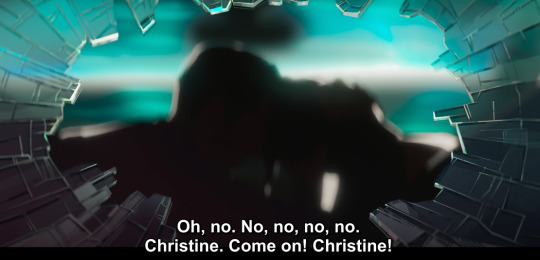
Again, Stephen blames himself. More than anything, this is so important because Stephen is all about guilt. We still need to meet Donna so we can add yet another layer of guilt. But the feeling exists. This is what corrupts Stephen’s heart and soul in all his iterations. This is what makes him the character I love so much. I love this SO. MUCH. In addition, his stubbornness to accept his condition. Man won’t take a no. This, this is Doctor Strange in character. Stop complaining about NWH Stephen, it’s pathetic.
Okay, “grief-stricken”, Stephen found the Mystic Arts and became a sorcerer. That’s when he learned about the Time Stone, the Eye of Agamotto and Dormammu. Nothing changes, he saves the universe. But time does not heal his deepest wound.

I love Wong so much. Every time Wong does something, the world is healed. Really. We’re going back to him as well but for now I’ll just leave this shot.
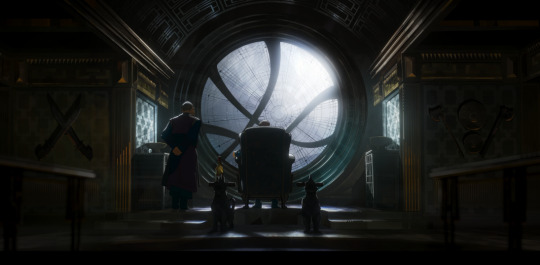
BUT STEPHEN, DOING SOMETHING RECKLESS? HE’D NEVAH
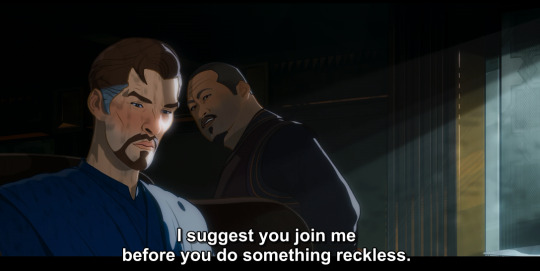
Aaaaaaaannnnnnd then he did.

He goes back in time. It’s been two years since he lost Christine. I think he reacted pretty nicely, despite the circumstances. Now let’s go back to that shot I said I was saving for later.
Stephen is so light-hearted here. Also, during the first time he lost Christine, he had no idea what “The Price is Right” was. He knows now, which means he probably tried to learn more about the show because of her, because of grief. HAHAHA MORE PAIN

AND THEN HE

AND THEN SHE DIES AGAIN
AND THEN HE KEEPS GOING BACK IN TIME
AND SHE KEEPS DYING
AND THE MUSIC
AND HIS VOICE
AND HE TRIES TO CHANGE FATE BUT IT CAN’T BE AVERTED
HE EVEN TRIES TO STAY AWAY FROM HER LIFE BUT SHE DIES ALL THE SAME, WHY
AND EVERY TIME THEY CRASH, HE FEELS THE PHYSICAL AND EMOTIONAL PAIN AGAIN AND AGAIN AND AGAIN, WHY
I’M-- *ugly sobbing noises*

Apparently, not.
And this scene when he simply... closes his eyes before she dies again...?
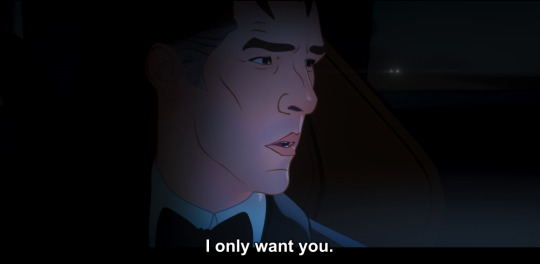

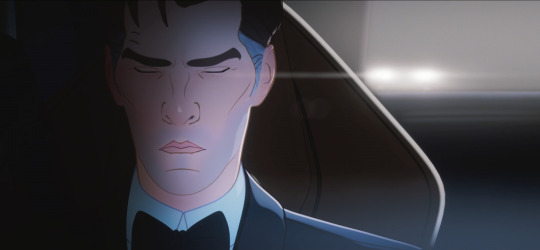
This is where this episode had me in endless tears. It got me the four times I watched it. I’m dead serious.
Okay, so, next the Ancient One appears to Stephen, explaining that Christine’s death is an Absolute Point in time. It cannot be changed. Stephen needs the accident to become the Sorcerer Supreme and defeat Dormammu.
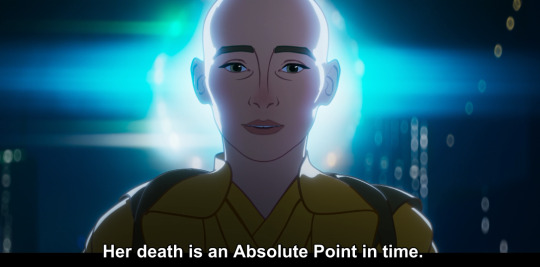
And this is where Stephen starts his journey into darkness. “Nothing is impossible, you taught me that. I only require more power.” Disobeying the Ancient One, Stephen then travels in time, seeking the Library of Cagliostro. Now, if you’re not aware of that, Cagliostro was a sorcerer who studied time in comics, and later became Sise-Neg (there’s a recent post on this because of the new Defenders run). It’s funny to think that Sise-Neg also destroyed the world when he became a god, however he grew past his pettiness and remade reality. Stephen did not possess such power, as we’re about to see.
PS: “Stop torturing yourself, Stephen.” Naur but he should use this line like a mantra. Especially comics!Stephen.
Not gonna lie, tho. This place reminds me of the Temple of the Vishanti from T&T (of course I was going to insert T&T somewhere, it’s me).

And of course they’d go for a pun with his name haha. I don’t know how to feel about this, tho. I feel like the episode is too heavy and dark for comedy. But it is what it is.
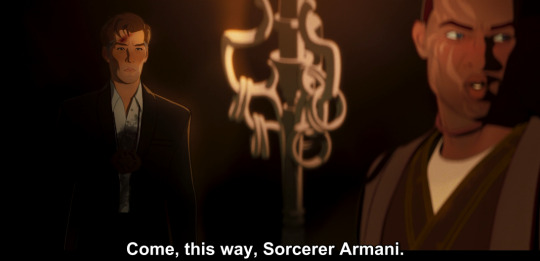
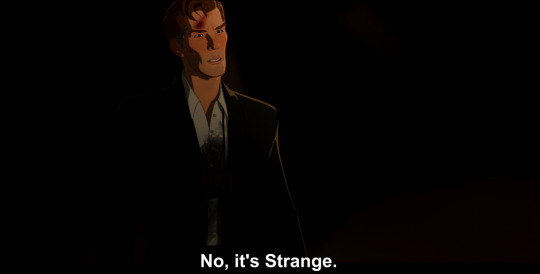

Okay but why some books are in cages??????????? And wow, it seems Cagliostro also gathered knowledge about several fields of magic.
And then Stephen learns that, in order to break an Absolute Point, he needs to absorb more power. This is when I went “oh-oh, here we go”.
And for real, is this Shuma-Gorath? Why are they keeping his name a secret? Is this the same creature from the first episode with Captain Carter, right? RIGHT? It has to be Shuma-Gorath.
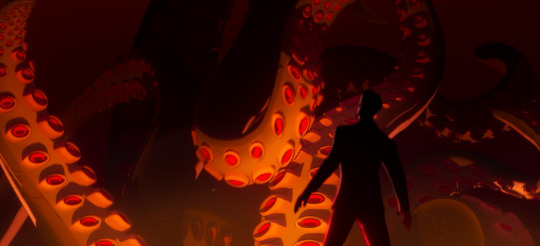
Of course he tries to be polite and ends up all hurt haha. O’Bengh warns him about love but he will not listen. “Love can break more than your heart. It can shatter your mind.”/ “Is she worth the pain?”. Please, this is Stephen. He eats pain for breakfast.
Also, also, let’s take a break. We’re finally going to get monsterf0cker tentacle-lover Stephen Strange. It will cost us everything but here we goooooooooooo (yes, I went frame by frame for your more obscure fanservice needs)
Gods, I love this sequence so much it hurts. Okay, here we go.
Shmebulock???????????

AND HE STOLE THE CAPE??????????? AND DREW THE LINE ON BUGS??????
The grasp this man is holding on me right now...
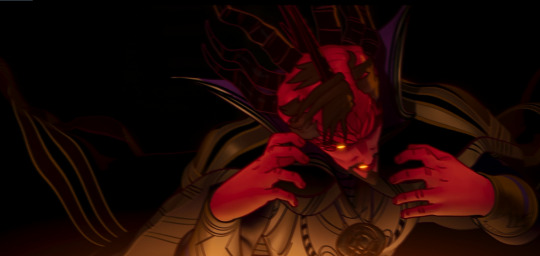
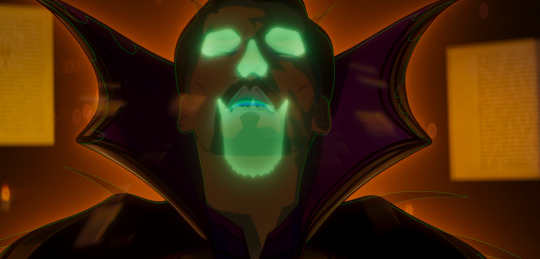

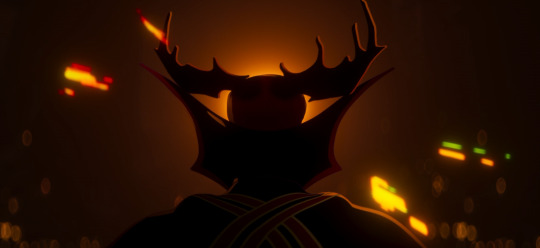
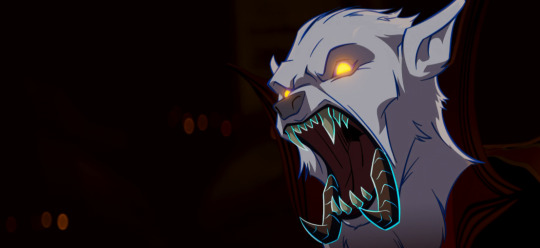
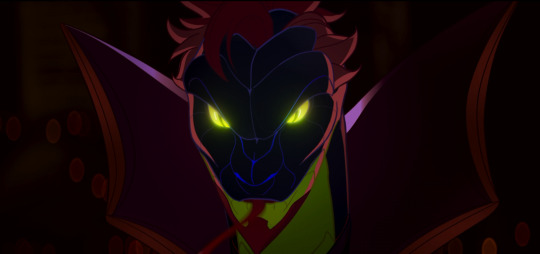
Some of you will understand. I’m with you.
And here are the grostesque ones. These are hard to take SS but I had to.
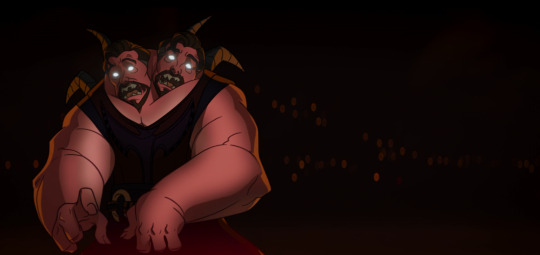



Animation, sound effects, OST? CHEF’S KISS TO ALL
And lastly... the tentacles. Yeah, if you’re new... this is a thing.

Fanservice. Fanservice everywhere. (low-key the reason I also waited to write this review, I wanted to enjoy this part so badly but I was too sad for that lmao)
Okay so. O’Bengh is suddenly OLD and DYING, until we realize that Stephen spent CENTURIES absorbing mystic beings. CENTURIES. WTF STEPHEN. He had nothing in mind but the goal to save Christine. And people wonder why he went insane???? I’m sorry, O’Bengh, but I can’t take you serious when you still call Stephen Sorcerer Armani. Oh, and also because you watched him absorb beings for centuries in silence lmao. But I guess I have to because you said that Stephen is split in two since the Ancient One cast a spell on him, splitting the timelines and making them exist in the same reality before he could travel back in time. I know, it’s complex. Anything for the plot.
And now good!Stephen has an evil!twin who wants to absorb him back in order to become whole and break the Absolute Point. Cool.
I said I wanted to talk more about Wong because I think people are not talking about him enough. Wong is so important in this episode. He’s the one who’s trying to heal Stephen after Christine. He’s Stephen’s anchor.
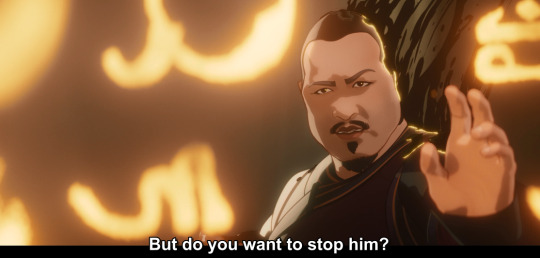

Also, THEY FINALLY USED A SPELL WITH THE NAME OF THE VISHANTI. HOORAAAAY
So, for the sake of our understanding, I’m addressing the characters as evil and good!Stephen. Let’s go. Evil!Stephen summons good!Stephen and gods, he still holds such a strong grasp on me... unbelievable. THE DEEPER VOICE BENEDICT USES???? PLEASE, DIDN’T WE HAVE ENOUGH?
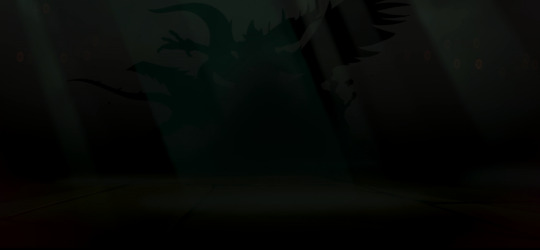

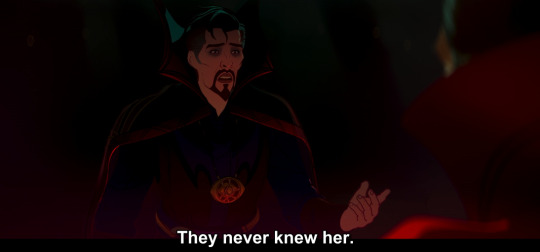
Imagine his strength to hold so many beings inside him, fighting to control him. BRO, THIS IS TOO TOO MUCH
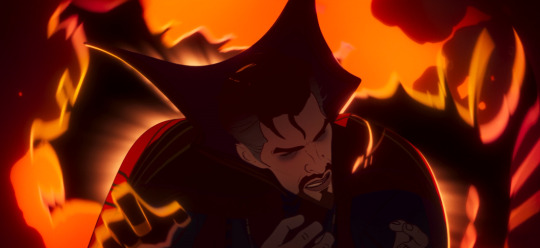
Fine, I’ll not post SS about the fight because I’d be here all night long but I WILL say this: NOT CLOAKIE!!!!! NAAAAAAAAAAUR
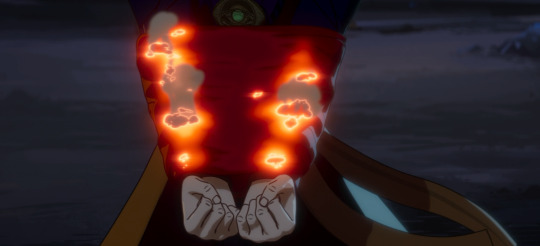
Also if you ask me if I recognize any of the spells? Maaaaybe the Flames of Faltine, the not-so-crimson Bands of Cyttorak and a little trick Magik does with her portals. That’s how far I go.
I’ll not comment on the “seducing yourself to stay in the trap”. I will not. I’ll just say that the first person Stephen thought of when “Christine” was talking about the crème brûlée was Wong. That’s it.
And finally evil!Stephen absorbs good!Stephen and releases... UNLIMITED POWER (I love when the stone goes red as if it was bleeding aaaaaaa)

I can fix him...
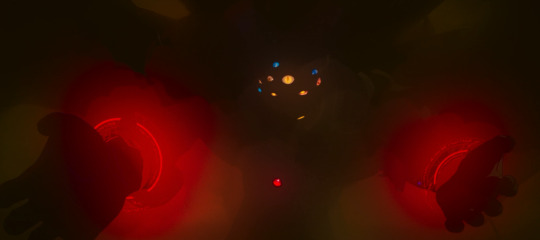
This scene here? Poetic cinema. (I love his wings so much)

And when Stephen says her name and the other monsters’ voices echo “Christine”, AAAAAACKKKK
AND OF COURSE CHRISTINE WOULD FREAK OUT, BRO. LOOK AT WHAT YOU’VE BECOME BECAUSE OF YOUR TWISTED LOVE. I’M NOT DOING FINE.
Oh, but it’s too late anyways because Stephen broke reality haha. This scene is interesting because Stephen is the only one who sensed and/or talked to the Watcher until now. I read an interview that the Watcher kinda showed up but it’s also about Stephen’s keen senses. Bit of both, let’s say. Still, man, 616-Watcher is not that cold. 616-Watcher would watch this and say “how about I intervene anyway?”. WhatIf!Watcher is brutal.
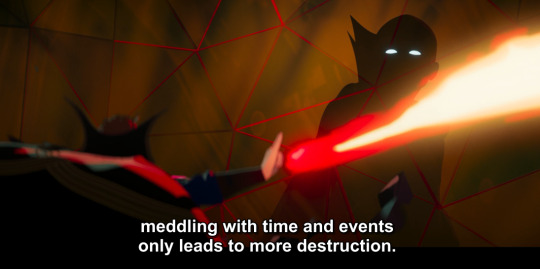
The way Christine looks at Stephen one last time also KILLS ME, DESTROYS ME, BREAK ME INTO A MILLION PIECES.
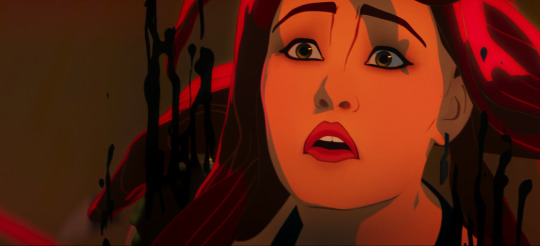
And this is where my soul left my body.

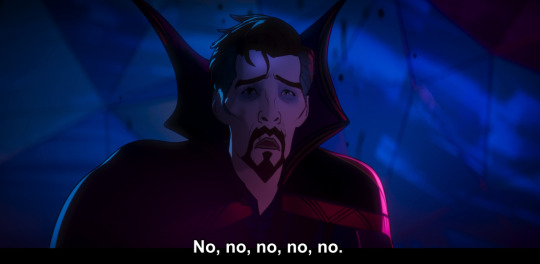
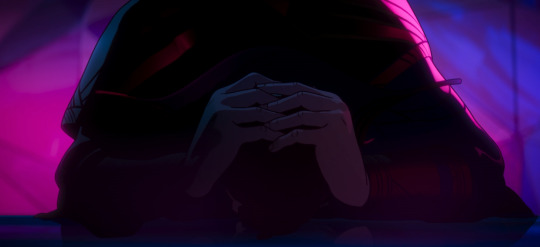

This is how they end the episode. This is how you leave me speechless and with teary eyes. This is how you give me a whole existential crisis.
This... this was brutal to watch. Really.
What can I say after this? I’m used to reading painful things when it comes to Stephen. Aaron’s and Cates’ runs are heartbreaking on so many levels. Hickman’s New Avengers is not easier. Coincidentally, What If? Magik Became Sorcerer Supreme and The End. And now Death of Doctor Strange. And yet, after everything I’ve been through, I’d never expect to watch something so brilliant, so tragic, so heartbreaking and unexpected in the MCU. Never. This is top tier content and this is my favorite character with SO MANY LAYERS and SO MUCH UNDERSTANDING. I can’t put into words how meaningful this whole episode is to me, or how deep it touched my heart and soul.
I’ve been struggling to find the proper words since then, I still can’t. All I can add is, I cried for the 4th time now. This is too, too much, even for Stephen stans. Even for the ones who are used to pain, regardless of which media you’re into: comic books, live actions or animated movies. This is literally more than I can take and yet I’m so, so grateful. The voice acting, gods, how did Benedict manage to create a better Stephen than the one he’s literally playing in real life???????????? HOW
This episode really took the max potential Stephen had to offer as a character, added tons and tons of layers based on his grief, depression, arrogance and need to control everything and created a tragic masterpiece. In 7 years of being a Doctor Strange fan, I've never read or watch something that could go this deep into the character. The closest I can think of is Mr. Misery and the metaphor of Stephen's depression. This is a whole new level of respect and understanding. This is more than a love letter. This is peak maestry. It’s perfect, it’s heartbreaking, it’s... gods, I can’t.
Sorry for dragging you until this far. Before I wrap up this review, I just wanted to remind you all that Stephen will appear again, he will smile again, he will be surrounded by people again. So this is not the end. It was painful but be brave. We still have a few more steps to take.

#what if...?#doctor strange#stephen strange#what if doctor strange lost his heart instead of his hands?#wong#christine palmer#the ancient one#long post#review#he did nothing wrong#so what? he destroyed a whole universe#/j#benedict cumberbatch
173 notes
·
View notes
Note
hi hey hello what's your opinion on haru/goro (not necessarily platonic or even romantic just their relationship as two people who have gone through similar trauma and are coping with it Very differently)
oh i have so many thoughts. i actually went on a bit of a rant about it on twitter recently so i might just copy and paste what i said there here MGKDHNJJFBSHBHD SINCE ITS VERY WORDY. im gonna put everything under a read more
i wish people would stop treating goro and harus dynamic as strictly "oh haru hates him so much and wants to kill him and goros a piece of shit." like. its very obvious even in canon thats not how anything is between them, its a lot more complicated than that.
a lot of interesting relationships in persona get watered down to easy-to-digest tropes and its so stupid cause goro and harus whole deal is so much to think about
haru literally sympathizes with goro to an extent due to the fact he also struggles with having a manipulative and controlling father. she knows it was all out of his control and thats what troubles her because she doesnt know how to feel about him still being involved in her fathers death. and dont even get me started on how she wasnt even able to properly process her grief and mourn because the circumstances made it so she has to deal with suddenly being a ceo at the ripe age of 18 years old. like. haru has so many repressed and complex emotions on this
idk i have a lot to say but it gets on my nerves seeing people misinterpret them. i honestly think some people just project their weird hatred for goro onto haru in some fan work with them despite it being genuinely out of character for her
how i interpret them is like. theres awkward tension and neither of them really know how to approach the subject without it getting too personal/uncomfortable. i feel they have potential to get along sometimes because they have some shared interests but obviously itll take a long time for them to get to that point
i also feel a lot of this comes from people watering haru down to being the "Cute but PSYCHO" anime trope instead of being, like, the actually good character she is in the game. but thats just me (i mean she couldve been better if atlus didnt ignore her all the time but when has atlus done anything right)
as you can tell i have a lot of shit to say <3 FDGHKMGMFDFSNJJFNJNG THANK YOU FOR ASKING
31 notes
·
View notes
Note
yeah I think a lot of it is this fixation on wanting her to be something she isn't and then getting mad at her for not being that whatever it is. she's not an insta baddie bitch and she never has been. now she's thriving and proving she can still create art when she is happy and healthy, and since she isn't providing them drama they're making it up and saying her lived experiences aren't real
they want her to be a lot of things she isn't and some seem to look down on the things that she is, despite her consistency. (the lying accusations make me super uncomfortable considering the immense trauma she went through after wrongly being called a liar, and people celebrating her downfall and making murals of her "death"...? idk is this coming from people who didn't live through how terrible that was in 2016? make it make sense.) she's always been enthusiastic, she's always been a romantic, she's always been someone who's earnest and feels things deeply, and during the time when she was more cynical and understandably barbed in her outlook, she was suffering and unwell. that projected image of perfection and shininess took a measurable toll on her physically and mentally. where she is now is healthy and genuine, and i can only imagine the strength it took to get there. i think a lot about her mentioning at tiny desk in 2019 that she was afraid she wouldn't be able to write when she was happy, and how thrilled she was to discover that wasn't the case, and that we need to deconstruct the idea that art and creation can only come from pain. obviously more intense grief followed her saying that in regards to her masters, but even with folklore/evermore she was proving that artistic expression and a real flourishing of creativity can come from many different places, the light and the dark. it's taken her a long time to process that - she's still learning it and working through it, it's evident with everything she's said and done for red tv, and that's very human, we all keep unpacking and reshaping things as we grow. it's wild to me that rather than appreciating the fact that she did go through and experience these things, and did have those tumultuous emotions (which in many ways are just 20-something feelings) that there's anyone intent on doubting her? her situation may be heightened due to the fame and glare of it all, but she's a person! the relationships she's had may have been unfairly splashed in the media, but they are all between human beings. (and the pervasive slut shaminess when her dating life was quite normal for someone her age, only in abnormal circumstances, is just...for what? because those men are famous too? okay, then where's the energy to drag them for their various high profile relationships? oh right, we reserve that for women. sigh.) they're not fictional characters, they're flesh and blood people alive in this world, dealing with their own issues and bringing their own unique outlooks and hearts and traits to everything they do. privilege and celebrity certainly affects and changes their lives, but it doesn't make someone not a person. she has her ups and downs through it, her loves and her losses. that's all still a part of her. idk why anyone's making this more difficult by doubting her veracity. she's a confessional/diaristic singer-songwriter. she has been that since she was a teenager, it's what she does. she's said many times that if she couldn't write, she wouldn't sing. the writing is imperative because it's uniquely hers. a huge part of WHY she's working this hard and this meticulously to recreate six entire albums is because it's quite literally her life story, her words, her emotions, her perspectives, and they belong to her. the least we can do is respect what she shares with us on that journey.
5 notes
·
View notes
Note
You know, there's a thing with characters that foil each other and serve as the "good" and "bad" respectively (Toga/Himiko, Tenko/Izuku, Nagito/Hajime, Ryoko/Hajime, Atsushi/Akutagawa) but that trope felt rather annoying to write, especially in the world I am trying to write about (ALTERNATIVE's world is basically MHA X BSD but like. 1000 times more fucked up and the Specialised are always prejudiced against. A terrible lot).
The title itself, ALTERNATIVE is to symbolise Romila's POV of "infinite choices and paths present for every being" and how she starts off the story with a decisive line of,
"Many people ask me if this could have been avoided. They beg for me to tell them that things could have been better. There are others too, who try to justify that this was the only way for things to have been. If you ask me, both are living in states of denial. One can't accept the stupidity of humanity for disregarding common sense for violence and prejudices. Another can't accept humanity's choice for having better circumstances if the one with the power chose to."
The thing is, the running theme is that the story is a bittersweet one, despite there not being many deaths of the main characters, but there was always a junction where you can see it could have been avoided, that there was an "alternative" for things to have gotten better, especially in the first book.
Another reason for the title is that it's basically an "ALTERNATIVE" to this world of ours, where super powers and stuff like those exist.
The subtitles of both the books (Myriad of Colours, Colour of Death) signifies Romila's power, "Aura Tracker" which lets her view people's aura as colours (Myriad of Colours is to signify the different kinds of people she meets, Colour of Death is about what affects her the most (death) and how she's constantly seeing that colour everywhere, especially now that it's war).
The thing about ALTERNATIVES is that Romila could have chosen to be a doormat (like Koldin tends to be at the beginning (his rp self is like THAT due to circumstances different to ALTERNATIVE's actual storyline. Also because Hack's a nicer person to be around than Romila is) in order to nOt hAvE cOnFliCt™) to not get into conflict and put up a super nice persona for people but she didn't. She decided to focus on hanging onto her reasons for doing what she does and using it to create a caustic personality to shield herself because she knows that she will regret being a doormat (Her Despair takes the form of Koldin Hopkins).
Now Koldin could have certainly put his hatred for society at the forefront and taken a caustic personality but instead chooses to be nice. Because he doesn't want to become as hurtful as the rest, that's how he wants to disentangle himself from society. However he, like Romila (who just took standing up for herself to extremes), takes this to the extremes causing him to gain the personality of a nice boy™.
However this also goes into why they made the choices they did (which is what Romila realises during the Mansion of Death arc), because for Romila, she didn't really have the psychology for actually becoming a doormat (because a) Her mom wouldn't have it b) She hated to be called weak c) She didn't have anyone to fall back to after the inevitable consequences of being a doormat d) She felt that if she were to live with monsters, then it's easier to blend in by being one (this comes useful to her when she infiltrates into the Government) e) She saw doormats getting suicidal which frightened her) or not becoming fully caustic (since her standing up for herself wasn't. Liked. By. Anyone. And seen as aggressive and she basically went, "Well if they see me as bad, I will show them BAD" which led to her breakdown causing the incidents at the Mansion Of Death (especially a twisted hatred against Koldin for extremely understandable reasons).
For Koldin, being meek and peaceful had let him get by in the streets and his skills to difuse fights had come in handy. Later when Dr. Hopkins took him in, he was well. A member of the Radicals who were known to be extremely merciless towards the Specialised (he had defected but Koldin had a REALLY good reason to be wary) so he figured if he stayed nice, he wouldn't be kicked out of the house and Dr. Hopkins being Dr. Hopkins just assumed that it was his normal and that behaviour carried into school. He figured that it was a horrifying thing to be aggressive and then saw how Romila got treated and decided that yep, he was right, that confirmed his world view alright and it was more reason to be super nice. While Romila saw Koldin as a person who everyone took advantage of (a thing she hated. To be exploited just like that) and went, yep that confirmed hers and it was more reason to be super angry.
However the thing is that, Romila was chided for being anything, which caused her to just give up to be peaceful (because what would she do? Anything she tried to do got her scolded) while Koldin (thankfully) found a support system. It really goes to show the difference a good friend can do.....
As it is, when I first began writing this, the most obvious choice presented itself to me. Koldin is the "hope" and Romila is the "despair" (on the protagonist, deutergonist side) but that seemed stupid and boring as it wouldn't make sense. Since I am trying to make a point of showing with how Romila's world view gradually changes from "there are wrong and right choices" to the fact that it doesn't have to be rigid and that *now* she wouldn't be hurt if she used what her vulnerable side wanted (a world free of prejudices and unnecessary cruelty) with the talents she had. That kindness mixed with her usual personality won't literally kill her.
And for Koldin, being a doormat means that he got taken advantage of a lot by different people and since he refused to actually stand up for himself ("Ah...aha......it seems that I can't..." "Can't what?" "Feel angry for myself......it's always anger that comes from the ones I love being hurt" "Then love yourself too, you will feel angry again" ~ Koldin's conversation with his inverted self in the Labyrinth) he got. Taken advantage of. By virtually everyone. However he decided that if being nice would keep him keep his self and his name self then it would be fine. He did not want to be the source of grief (his actual parents tossed him out because of his Specialisation). The Mansion Of Death actually causes him to snap for that reason, because Romila literally puts him in a torture dream "for the greater good" and then proceeds to kill his dear friend. One thing Koldin HATED. Killing friends. (Due to them being run over by a car, which led to his paralysed left arm)
Now on the other side, their respective friends:
Romila:
Luja: Cynical and annoyed by people's stupidity but not to caustic extents and she wants to be a scientist and isn't haunted by the possibility of dying.
Kratanos: Full of anger and hatred against the world but not entirely blinded by it and is focused to using that anger for reformation of the world (she becomes a therapist later, to help people)
They both have her caustic parts but they also let themselves embrace another side which makes them her "balance".
Koldin:
Anand: Believes that there's no requirement for violence unless it's absolutely necessary.
Karishma: Figures it's a better idea to just listen to rules but doesn't hesitate to break them if she sees that they are bs
They both have his peacefulness, but don't hesitate to do what they think they should do, which makes them his "balance".
The point is that, the case of choosing alternatives isn't possible with a tunnel vision. Even so, there are choices that literally can't be made due to the individual and circumstances. Sometimes the choice is to choose more than one choice. Well, that's one dramatic storyline......
It reminds me of DDLC side stories since everyone has a bit of the other person's solutions and more of a opposite personality (don't take this the wrong way, there are many stories like that and it's honestly a favourite to think abt but it's just that DDLC does it well especially since it's only a school environment). Tbh, I like dramatic storylines that rlly dig deep into a character's perspective (reasons why I'm in love with Hack and Axel in particular). My whole thing is that I'd rather read a story with interesting and in depth characters than one where only the plot is good so I say you made the great call of the century with Koldin and Romila's characters.
What you thought before getting into it is rlly how every great character arc starts. You focus on one, somewhat forget the other one until you review every single character for inspiration and then BAM! PARALLELS! It's really admirable how, even in this messed up world of specializations, you didn't purely focus on the plot bc it honestly sounds interesting enough to just stick around for Romila's life and journey. You could have ended it all with just that, but no, you smacked Koldin in there and said "be my interesting on par character that can kick Romila's gut" and IT WORKED SPECTACULARLY!!!
I really love ur writing and hoping to one day read (and maybe print out) every story you've ever written bc GODDAMNIT I NEED THE FEELING OF THOSE WORDS ON WORN PAPER WITH AN ARTISTIC COVER AND AN AMAZINGLY HEAVY WEIGHT
Aka, paperback. Bc that's how I like to roll and that's how good I think it is. 1000% worthy of a bestseller
14 notes
·
View notes
Text
Two Can Keep a Secret (if the Family Tree is Dead) — Thoughts on: Ghost of Thornton Hall (GTH)
Previous Metas: SCK/SCK2, STFD, MHM, TRT, FIN, SSH, DOG, CAR, DDI, SHA, CUR, CLK, TRN, DAN, CRE, ICE, CRY, VEN, HAU, RAN, WAC, TOT, SAW, CAP, ASH, TMB, DED
Hello and welcome to a Nancy Drew meta series! 30 metas, 30 Nancy Drew Games that I’m comfortable with doing meta about. Hot takes, cold takes, and just Takes will abound, but one thing’s for sure: they’ll all be longer than I mean them to be.
Each meta will have different distinct sections: an Introduction, an exploration of the Title, an explanation of the Mystery, a run-through of the Suspects. Then, I’ll tackle some of my favorite and least favorite things about the game, and finish it off with ideas on how to improve it.
If any game requires an extra section or two, they’ll be listed in the paragraph above, along with my list of previous metas.
These metas are not spoiler free, though I’ll list any games/media that they might spoil here: GTH; SPY; mention of ASH (and the ASH meta); mention of Nik/HER’s spoilery hints about GTH.
NOTE: THIS META CONTAINS DISCUSSION OF AND REFERENCE TO SEXUAL ASSAULT. MORE DETAILED SECTIONS ARE MARKED, BUT THIS WARNING STANDS FOR THE WHOLE META.
The Intro:
It’s time to get our Spooky on, lads. And we’re gonna do it in a meta of truly staggering length, so maybe go to the bathroom and get a snack before you start. My apologies.
Due to the (to be quite frank) absence of nostalgia surrounding them, there’s not really many games that are post 2010 that the fandom tends to agree on, but Ghost of Thornton Hall happens to be a standout in that pretty much everyone has found something to like about it. It often tops the charts of “best newer game” polls, and puts in a valiant effort against the more nostalgic mainstays.
There are a lot of reasons for this, in my mind – the quality of the writing, the choices that Nancy can make that actually affect the outcome of the game and especially affect Nancy, the fabulous voice work, the purposely-unanswered questions that give a deeper sense of horror — but if you ask me, the love for GTH really boils down to one thing:
Atmosphere.
Nancy Drew game fans (and I’m including myself in this) tend to prioritize atmosphere in the games, probably because without good and proper atmosphere it’s easier to pick apart the formula as you’re playing and to avoid being immersed in the game’s story, and GTH has it thick on the ground (figuratively and literally). The fear, unease, and overall sense of being an Intruder in this story comes from the overwhelming atmosphere provided by the grief of the characters, the time-sensitive nature of the crime, the secrets of the house and family, and, of course, the rather stellar visuals and locations.
The Thornton’s house and grounds really feel alive, but dead — in fact, they almost feel alive in the way that a zombie is, where they function and feed but have no heart. The gloriously (and meticulously) decorated walls are cast in shadow and grime; the portraits feel ominous and disapproving rather than lifelike and nostalgic; even the graveyard, as spread out and opulent as it is, feels claustrophobic and unwelcoming.
In a word, the game is – visually, thematically, story-wise, and atmospherically — haunting. And I think that overwhelming feeling of being haunted is, in large part, what draws fans back to this game again and again.
It should come as no surprise, then, that the scariest parts of this game are the things that you, as the player, do not see. Sure, the apparitions of Charlotte, the ghostly figures, the appearance of Harper — these are all scary, but the fear is gone after a moment, leaving the player unsettled but not running to hide under a blanket. The deaths of the fifty-four souls, the secret behind Clara’s birth, Harper’s breakdown — all these things that you don’t see, that you can only hear about or have hinted at are where the fear of the game kicks in, especially for older players.
It’s no secret that, despite the games being labeled for ages 10 and up, that the actual age of the Nancy Drew games fandom hasn’t been around 10 for some time — most people playing these games are in their 20s or 30s, or have siblings who are in their 20s and 30s and got into the games through them. Sure, there are some outliers, but the Clue Crew is much closer in general to the ages of the River Heights crew than they are to the age that that box says.
Because of this, the writers (and I’m going to especially hat-tip Nik here) behind the games have been able to slowly graduate the topics of the games to be a little bit older, hiding the true horror behind things that younger kids just won’t think about. This is especially the case with GTH and SPY, but you see it in a lot of the newer games, where the implications of events are normally scarier than the events themselves.
GTH takes that and runs with it, choosing to hint at and dance around truly upsetting — for any age — topics, presenting a mystery and a story that only get scarier once you’ve finished staring at the screen. The characters’ emotional problems and issues — loss, abandonment, anxiety, guilt — are like this too; while they’re present in the game itself, when you take a step back after finishing the game you realize just how badly scarred everyone is in the story.
Because answers were purposely left vague in order to 1) make the player work for it and 2) keep the 10+ rating, pretty much everyone who plays GTH has a slightly different opinion on what went down at Charlotte’s party, who the Thorntons really are, the circumstances of Clara’s birth, why the children of a female Thornton take their mother’s name — you name it, and there’s around 10 distinct opinions on it, and many more offshoots of those opinions besides.
I’m going to talk a little bit here about a couple of the “biggies”, since I don’t want it cluttering up the Suspect portion of this meta, so bear with me. I’m not so much interested in “this is the Correct answer” as much as just presenting the information from the game and wondering about its conclusions…but I (like everyone else) have my little pet theories, so what follows will be a little bit of reporting, a little bit of inference, and a little bit of supposition.
What follows is a frank discussion of topics such as rape and incest as they apply to GTH. If this is something you’d rather not consume, skip down to the next bolded line.
The most talked-about question left hanging in the game is, of course, who Clara’s father was. I think this question is best addressed from a two-pronged approach, however, because to figure out who Clara’s father could have been is a question that requires another question to be answered: why would Clara’s mother not tell her, even on her deathbed.
The most popular — and horrifying — answer to this is that Clara’s father is Jackson, and that she was a product of rape and incest. Now, just looking at the timeline, this theory adds up; Rosalie (Clara’s mum) would have been 25 when her father was 51 and would have raped her — young enough (especially in relation to her father, a middle-aged man of a lot of power in and out of the family) that she would have been scared to tell anyone anything, but old enough to not have it be super out of the ordinary that she got pregnant and had a baby — especially in 1968.
To add to this theory, there’s the note in the cellar that asks “who was this Jackson?...what’s he hiding, and who put it there? Was it Charlotte?”. If you’re looking for clues with the incest theory in mind, this seems to point directly to it — “who was this Jackson”? both Rosalie and Clara’s father. “What’s he hiding”? his crime of raping his daughter and impregnating her. The mention of Charlotte alludes to the supposition that Charlotte found proof of this crime — tangible proof — and put it somewhere; this pretty much supposes that there’s a document somewhere that names Jackson as Clara’s biological father, such as an admission of guilt or a paternity test.
The final “proof-positive” to this theory is that Rosalie refused to tell Clara who her father was even on her deathbed. We know from the family tree and Wade that Clara was between 5-10 when her mother died (I’m inclined to believe the family tree, and chalk the discrepancy up to either the writers not being concerned with math or, more likely and more charitably, to show that Wade isn’t a Perfectly Reliable source, just like everyone else), and Rosalie’s protection of Clara from the truth makes sense with a child in that age span. It’s one (horrible, horrible) thing to be forcibly impregnated by your father, but to have to say it out loud, and to say it to your child — that’s something that no one can even remotely blame Rosalie for not being up to, especially when weakened by sickness.
There are smaller points — like pointing out that this might be why Virginia (Wade’s mum) was skipped over in inheritance — but these small points have dozens of explanations, so they’re not really good for bolstering a theory unless you’re already dedicated to it and are looking for crumbs to shore it up.
End of frank discussion. The previous topics may be alluded to and/or mentioned, but not discussed in detail from this point on.
Now, let’s talk about another explanation. I think there’s a tendency to jump on the “Jackson Theory” because 1) there are clues that support it, but more importantly 2) because it’s horrifying, and it’s natural to leap to the scariest thing you can think of when considering a game that relies on fridge horror in the first place.
In the “Jackson Theory”, Rosalie would have hidden Clara’s parentage because of shame, horror, and trauma, and probably to (at least momentarily) spare Clara’s feelings — but Jackson isn’t the only explanation for her reticence.
Generally, we can break apart the reasons for Rosalie’s silence into three distinct emotions or emotional states: shame (supports the Jackson Theory), trauma (supports an assault by a known wolf), or, often overlooked, ignorance.
Clara is mentioned repeatedly as being outwardly and obviously scared about her place in the family — a fear borne from and exacerbated in her childhood, as Nik plainly states (“her insecurity wasn’t just a personal flaw, it was a response to her uneven upbringing,” emphasis mine).
An easy way for Rosalie, worried as she must have been about leaving her daughter alone, to fix this if Clara really was a product of incest, is to name a distant Thornton cousin, preferably one who was already dead or out of the picture, as the father, which would assure Clara’s place in the Thornton line by both blood and her future adoption. This way, if Clara’s parentage was tested, she’d show up as a Thornton from both sides in a way that wouldn’t be suspicious, and her daughter would have an easier life.
But Rosalie didn’t do this — she never even hinted at the identity of Clara’s father. As a woman known primarily for secret keeping — not just about Clara, but about everything (“She loved her secrets,” Wade says), Rosalie would have been adept at hiding things through various means, including through lies and subterfuge, not simply staying silent. Given the little we know of Rosalie’s character, then, let’s consider why she wouldn’t have said anything — even something false — to ensure her daughter’s safety when she died.
Looking outside of Jackson (and with any other known Thornton being quite unlikely), the vast majority of assaults are committed by those known to their victim — friends, acquaintances, classmates, etc.
The Thorntons were — and are — an incredibly powerful family, both monetarily and socially. Having dealt with families such as the Thorntons before in matters like this one, it is frankly incredibly unlikely that, had Rosalie been assaulted by someone she knew, that the truth wouldn’t have come to light through another source, and that the perpetrator would have been punished in every way possible.
BRIEF DISCUSSION OF ASSAULT STATISTICS AS THEY RELATE TO ROSALIE’S POSSIBLE CASE.
Some people familiar with only the post-20th-century world as “the modern age” and with a less stellar grasp of the pre-tech-boom world might raise an eyebrow at this supposition of punishment, but this is Exactly what would have happened — and did happen with regularity — even as “far back” as ’68 — especially when the crime was committed against a young, privileged, wealthy woman of the community.
Note, this is after the USMPC adjustment to the definition of rape in ’62, but before the adjustments in the early 70s; in 9 years, forcible rape rates (this number includes only female victims, so the true number of victims is indisputably higher, given the enormous jump in rape statistics in 2016-present as male cases have been included) had soared in the United States from around 17,000 per year in 1960 to, in the year Clara was born, 31,000 reported cases (source: DisasterCenter). With these soaring numbers came soaring awareness, and combined with Rosalie’s identity as a rich, powerful young woman in a rich, powerful family, it’s on the outside of belief that, had her attacker’s identity been known or suspected, that it could have remained a secret and gone unpunished.
END OF BRIEF DISCUSSION OF ASSAULT STATISTICS AS THEY RELATE TO ROSALIE’S POSSIBLE CASE.
Given this historical and social backing, the simplest and unavoidable potential answer to why Rosalie wouldn’t have either told Clara who her father was or made up a “brief love” who abandoned her Dishonorably, is this: she didn’t know.
(I’ll spare a mention here to say that, ignorance because of being a “wild child” in the 60s and having had multiple partners would be a possible theory, but it disregards everything else we know about Rosalie and her behavior, and that her reputation as a party girl would have been common knowledge, unable to be hidden from those who were alive at the time. So let’s move on to what else would cause ignorance.)
Though attacks by a person unknown to the victim are, in relation to known assailants, rare, in the absence of other evidence, the simplest answer to Clara’s parentage was that Rosalie was assaulted by someone that she did not know and had no way of knowing — and who had no idea of the social power of his victim.
Rosalie truly left nothing behind that points to her daughter’s parentage, even for later discovery or for Clara’s private eyes in a bank lockbox when she came of an Age that Rosalie deemed appropriate — so the conclusion to be drawn is, in the absence of evidence, that Rosalie didn’t answer Clara’s question because she simply couldn’t.
This ties into the other theory/mystery I want to cover here — that of what happened the night Charlotte died, and how (and in what way) Clara was culpable and responsible for Charlotte’s death. We know that, according to her, Clara went there simply to “scare” Charlotte — and given the circumstances that Clara gives this confession in, I’m inclined to believe her — and it’s my opinion that the reason didn’t have anything to do with the truth of the identity of Clara’s father.
My stance here — and it’s here that I take a solid stance, rather than presenting options — with Charlotte (and I’ll talk more about her general character in the Suspects section) is that Charlotte found the same breadcrumbs as the players did and came to the same conclusion — that Jackson was Clara’s biological father. The difference, however, is that I believe Charlotte’s conclusion to be understandable, but ultimately incorrect, and that Rosalie’s assaulter was a stranger.
Horrified, this is where Charlotte’s “cryptic obsession with Jackson” (mentioned in the note in the cellar) began, and what led to her changing the beneficiary of her will from Clara — poor, pitiable Clara, already a victim of so much, whose insecurities would be compounded by this truth — to Harper.
An important part of this theory — and of really any theory — is the consideration that Clara was pregnant with Jessalyn at the time. Not only does this partially explain why Clara’s thought was to save herself (and her baby) rather than dragging Charlotte out with her (regardless of any other factor), but it also brings a potential answer as to why Charlotte would change her will to favor Harper, rather than Clara. Just as the cellar note asks “Who was this Jackson?”, I find myself asking a similar, but no less important question:
“Who was this Austin Neely?”
Listed as Jessalyn’s (still living) father on the family tree, Austin Neely isn’t present anywhere else in the game — not by name and not through mentions of “Jessalyn’s father” or “Clara’s ex-husband/ex-boyfriend” or anything like that. There’s not even a mention of Clara contacting him as a guest for the wedding or to help search for their daughter. His absence is glaring, especially in a game so focused around family — so the question of who is Austin Neely is a question that seems incredibly important to me, given that Clara was pregnant at the time of Charlotte’s death.
In mentioning this theory, I do fully acknowledge that I have only some circumstantial evidence — mostly emotional, and based off of who the characters are/were — to support it, but given the total lack of information on Austin Neely, my guess is as good as anything else.
So here’s my theory: Austin Neely is not Jessalyn’s father, and Clara, like her mother, became pregnant via some type of assault (and given that this was the late 80s and given Clara’s age at the time, I would say the most likely culprit is date rape). When Clara became aware that she was pregnant, given her insecurities about her place in the Thornton clan and her lack of knowledge of her own father, would have come to this conclusion: she was not going to let her baby go through what she herself went through. So she did what her mother could have — and honestly speaking, probably should have — done, and lied.
Austin Neely was probably a friend or an acquaintance of Clara’s — someone her family didn’t really know, but that she could make up a story about dating/being engaged to and became pregnant by before it all fell apart. He would have likely received a payout (probably a rather large payout, given the Thornton’s money and influence) and disappeared from the area and the Thornton’s lives, signing off any responsibility or claim to “their” child before he left.
As a result of this, her child now has a father and doesn’t have to grow up wondering, and Clara avoids the stigma, court case, and general Uproar that would come with attempting to find her attacker. She also, importantly for her, avoids that mess for her child, who will grow up in a semi-normal atmosphere, surrounded by family, not doubting her place in the world — and no one has to know.
Except, of course, one person would know. The head of the family: Charlotte Thornton. From then on, based on this series of events, the story behind Charlotte’s death becomes quite straightforward.
Clara’s paranoia and general cleverness clue her in to the fact that Charlotte has changed her will in Harper’s favor, and is scared out of her mind; having recently experienced a trauma and being pregnant with a child, she’s afraid that she will be left with absolutely nothing, that her machinations with Austin Neely and all her striving will have been for nothing, and she will be cast off, unable to give her child the life she wants to give her.
Compounded by her ground-in fear that she does not belong, she decides to try to settle it with Charlotte — she’s going to scare her, to punish her, and make Charlotte rethink the changed will.
And Charlotte, bearing the weight of the family name and business, not to mention its continued propagation on her shoulders, sees a woman who has been — like her mother — assaulted and left pregnant, whose mental state is already fragile, and who the “revelation” of who Charlotte thinks her true father is would topple her completely — sees poor, pitiable, emotional, suspicious Clara, and refuses.
I think that, more than anything else, would have set Clara off. Remember what she yells at Charlotte’s ghost?
“You had so much, so much, and I had nothing.”
In answering some of the questions about the game, Nik/HER’s response is to say that Clara did not literally light the match that burned Charlotte alive — but we know that Charlotte burned all the same. In the video of her birthday, there are candles; in the dust and soot on the floor where Charlotte died, we see candlesticks. And in the response, again, we know that Charlotte lit the candles for the celebration.
In my ASH meta, I discussed the many meanings of the word “fire” and the term “setting the fire” — and that’s important here too. In this case, the fire was set by Charlotte refusing to reconsider the terms of her will; in her refusal, she probably touched on the same point that she makes in the note in her room — that Clara isn’t stable enough to take over the company. Now, I doubt she would have said that straight to Clara’s face, but even framed as a “you have enough to be going on with and I don’t want to burden you” sort of thing, that just would have reaffirmed all of Clara’s fears — that she was unwanted by the Thornton clan, that her child would be unwanted as a matter of course, and that she would truly have nothing.
And so my guess would be that Clara shoved her. Not hard enough to break anything, not even into a direct flame, but shoved her, and Charlotte jostled the table, and a candelabra fell to the floor, where we see it still in the modern day.
When Nancy sees Charlotte’s ghost out in that house — and yes, I’m firm on that being Charlotte’s actual ghost, as she’s out in the open air so carbon monoxide doesn’t figure in, and there’s no way for that to be Harper/Jessalyn — she burns from the skirt up, which follows with a candle falling to the floor and lighting that incredibly flammable dress on fire.
The last thing to note from HER/Nik’s response is that at the end of the game, Nancy faces the exact same choice that the Thorntons have: to help, or to save herself. In this, we have to look back to Clara and Charlotte, and conclude this: Clara chose not to help. It’s debatable how much help she could have really been — we’re not sure how pregnant she was at the time — or if it even occurred to her until she was already out and chose not to go back in — but at the very least, Clara’s guilt comes not only from the fact that she quarreled with Charlotte right before her death, but that she could have tried to prevent it, and didn’t.
Given the supposition that Charlotte was literally on fire, I really do doubt that getting her out or finding water to throw on her would have been successful, but it doesn’t matter — because Clara looks at it as a choice, and Clara (more importantly) looks at it as the wrong choice, and a choice that she’s been punished for since the day it happened. That’s why, when speaking to Charlotte’s ghost, she says this:
“Haven’t I suffered enough for you?”
The last point I want to make in this OBSCENELY long introduction is about GTH’s place in the pantheon of “Haunting Games”. When you look at the bare-bones (heh) circumstances that make up GTH, you’ll start to see shades of other games.
A relationship/marriage gone a bit wrong, a family secret, an ancestral home, a relative/ancestor whose spectre looms over the story, mysterious apparitions and appearances, and Nancy’s status as an outsider and a skeptic — yeah, both CUR and HAU should come to mind immediately.
Having said my piece about, well, the badness of CUR and HAU and their unsuccessful approach to their basic plot points, it delights me that GTH takes a good hard look at them and says “well, what if we did this well this time? What if we gave our characters the complexity, the emotional resonance, the secrets and lies that we should have the first time?”
Like CUR and HAU, the Family is at the center of the game — except this time we believe in this family, in their relationships to one another, and we feel the effects of the family and their choices, not just hear about it from a diffident 9-year-old or a cranky caretaker. The history of the Thornton clan comes alive through the house, the graveyard, the books and journals that we have of them. We understand what this family is and the choices that they make — even if we don’t approve of them — and they feel real, not just like a background chucked in to Make The Spooky Things Happen.
Also like CUR and HAU, we deal with a central relationship and the complexities that come over two people deciding to get married. Happily, this game (unlike CUR and HAU) treats the central relationship as a thing of Import, and comes to the conclusion that it’s the happiness and well-suitedness of the couple that matters, not the family that surrounds them or anything else. It asks the question “what happens if one person runs away from the relationship?” and answers it, quite satisfactorily, with “there are probably some issues that need ironed out before anything else should happen”.
Interestingly, GTH also takes the good points of CUR and HAU – especially HAU’s atmosphere and CUR’s love of family tidbits — and improves upon them as well. Instead of Jane showing off her studies so that Nancy can solve a few puzzles, Wade walks her through the Thorntons were (at least in his eyes) and helps her get to know the people she’s helping. Instead of being duly impressed at the atmosphere in a bombed-out castle, everywhere on the island is teeming with fog — literal and figurative — as Nancy tries to decode the past to help the future.
Now then, let’s leave the general behind, and focus on the specifics of GTH.
The Title:
Ghost of Thornton Hall is a great title in the way that Secret of the Scarlet Hand is a great title – moody, evocative, gives us our location/focus right away, but not in a way that spoils anything, etc. If anything, it’s a little more flexible – are we dealing with The Ghost of Thornton Hall (Charlotte), the ghost(s) of the Thornton family, the ghosts of those who died on the island, or — in a very fun way — are we talking about the ghost of Thornton Hall — the spirit of the building where so much life and death has happened?
As a title for a Haunting game, you really don’t get much better than GTH, and it centers the player’s attention right where it should be — on the messed up family that the game centers around, and how their past impacts their future.
The Mystery:
Nancy’s phone rings in the middle of the night, with Savannah Woodham’s drawl on the other end, informing her of a kidnapping that’s taken place. She’d go herself, but believes wholeheartedly – and is frightened by — the ghost that’s taken up residence on Blackrock Island, Georgia, and doesn’t believe she’d be enough help.
Of course, this isn’t the whole truth, but we’ll get into that later.
Armed with both her detective skills and her inherent skepticism, Nancy sets off for Georgia to find the missing bride-to-be. Of course, when she gets there, she quickly discovers that the family — and family history — is even murkier and laced with tragedy than the presence of a ghost would suggest, and that, even with everyone searching for Jessalyn Thornton, she is nowhere to be found.
To find her, Nancy has to delve deep into the Thornton family lore, Jessalyn’s relationships with her family and friends – not to mention her preoccupied fiancé — and figure out what really did happen to dear, sweet Charlotte Thornton nearly two decades ago…
GTH, as a mystery, is chock-full of hints, clues, red herrings, and background facts that make figuring out the truth behind everything a joy and a delight — not to mention a task that will take more than one playthrough. GTH is also unique in that its mystery can end in more than one way, and that Nancy’s choices actually have more of an impact than just what souvenir she sends home to her erstwhile boyfriend. Choosing to save herself, to save just the “innocent” (for a certain value of innocence), or to save everyone leads to different endings not just for Nancy but for everyone involved with the Thornton Clan, from its matriarch all the way down to a certain spook-hunting ex-girlfriend.
Underpinning the mystery is this question: did Charlotte really come back as a ghost to haunt Blackrock and the Thorntons, or are her appearances just the result of sneaky relatives and atmospheric maleficence? Can all of the sightings be explained by a mixture of carbon monoxide poisoning, a few relatives playing dress-up, and huge amounts of suggestion and guilt? Is it the case, as Rentaro posited a few games earlier, that a ghost doesn’t have to be real to haunt you?
In a word, no. In a few more words, of course not.
Tying the whole of the ‘haunting’ mysteries together is this (previously mentioned) fact: Nancy is not remarkable for being a Skeptic, she is remarkable for being a Skeptic in a world where ghosts exist. The moving wood (and possibly the silhouette) in MHM, Camille’s ghost dancing along in TRN, the reflection of Kasumi in the water in SAW, the ghost of the Willow in GTH — these are all real, unexplainable-by-tech-or-imagination ghost sightings, and the fact that Nancy doesn’t believe in them doesn’t change their reality one bit.
In the house, you can cite carbon monoxide and Jessalyn/Harper running around in a costume for at least some of them — though not all. But the sightings outside — carbon monoxide does not stay in the system for very long in clear air, blessedly — of Charlotte? The consistency of the spectre? The apparition of her burning up at the site of her birthday party? These aren’t things that you can explain by costume theater — especially since these sightings have been happening for over a decade by people who haven’t stepped foot in Thornton Hall.
When they say that Blackrock belongs to Charlotte and has since the fire, it’s not a literary turn of phrase — Charlotte is there, and refuses to be forgotten. Nancy’s status as a Skeptic prevents her from hysteria, but it does not stop her from being haunted by the Ghost of Thornton Hall.
Now, let’s talk about the players — dead and alive — that make this mystery as complicated and dark as it is.
The Suspects:
Beginning with the matriarch of the Thorntons seems as good a place to start as any, so let’s talk about Clara Thornton. Cousin to Charlotte and Harper, Clara was taken in after her mother’s untimely death (but before her aunt and uncle’s equally untimely deaths) and became the equivalent of a sister in at least Charlotte and Harper’s eyes — though Clara herself was always unsettled and wary about her place in the family.
After the events of Charlotte’s tragic birthday (covered above), Clara visited Charlotte’s grave every night for a year, and was hospitalized after being pushed off of the widow’s walk (more on this later). Whether due to her upbringing or her Thornton blood – or, most likely, both — Clara is secretive, paranoid, wracked with guilt…and a loving mother and extremely capable businesswoman.
Though GTH doesn’t actually have a culprit —Jessalyn wasn’t kidnapped and Charlotte wasn’t murdered — Clara is, as the resident secret keeper and witness to Charlotte’s death, the closest thing that we’ve got. Clara’s sense of guilt is far beyond anything that she could have done, and is haunted so completely as to turn her rather cold.
I have a lot of sympathy for Clara, who made a mistake in a fit of anger (whether that’s pushing Charlotte or just not helping her when she started to burn) at the age of 21 and has been wracked with guilt and haunted by the spectre — real and imagined — of her ‘sister’ ever since (not to mention knowing that her other ‘sister’ blamed and hated her for it). Charlotte died before she had the time to make too many mistakes, but Clara had the entirety of the estate and the business — thousands of people’s livelihoods — thrust into her hand when she was a single mother of 21 years of age. Even had Clara been completely stable, it would have been a lot, and it’s no wonder that she rules the company with an iron fist.
I also want to point out that, due to Harper’s breakdown at the funeral and her afterwards, that even had Charlotte’s second will been found right then, Clara still would have inherited until at least Harper received her bill of mental health, as the closest heir to Charlotte of (legally) sound mind and body.
Let’s talk then about the other heir, Harper Thornton. A fan favorite for a myriad of reasons — her Helena-Bonham-Carter-esque design, her wonderful VA (props to Keri Healey, voice of Hotchkiss, Sally, Paula, Simone, and Madeline!) knocking her lines out of the park, and her dark sense of humor, Harper is, like most of the Thorntons, incredibly unstable, paranoid, violent…an affectionate aunt, and a pretty darn good detective in her own right.
Since GTH doesn’t have a ‘culprit’, Harper stands in her own guilty/not guilty paradigm along with Clara. She had nothing to do with Charlotte’s death personally, but was the one who caused assorted injuries and thousands of dollars in property damage at the funeral, and the one who pushed Clara off the widow’s walk and hospitalized her. Yes, Harper was young — 18 when Charlotte died, but pushing your cousin/sister off of a balcony is wrong at any age.
It’s worth noting that of the three Thornton ‘sisters’, one is guilty of some degree of manslaughter/criminal negligence, and the other of attempted murder. When Charlotte notes that she herself has a dose of the “Thornton paranoia”, she’s not just whistling Dixie.
The biggest problem the Thorntons have, honestly speaking, is that all of them are way too emotional and react without thinking. Clara confronting Charlotte, Charlotte not taking Clara aside to talk about the will, Harper’s injuring of others and blaming/pushing Clara, Wade destroying machinery, Jessalyn disappearing rather than talking things out…none of the Thorntons, past or present, have seemed to think with their brains since the woman who received the land on Blackrock Island after the Civil War in the first place.
In keeping with the theme, I want to talk about Charlotte Thornton next. A girl who inherited the Thornton land and business at way too young an age — I don’t even wanna know why Jackson hated his adult daughter Virginia (and yes, I know that there’s a supposition to this in the “Jackson Theory”, but it’s pure supposition) so much that he would stake the family future on a 20-year-old, no matter how much everyone liked her — after the death of her parents four years prior, Charlotte was the darling of the Thornton family.
Well-liked by everyone with a beautiful singing voice, Charlotte was nonetheless every inch a Thornton; she outright acknowledged her own paranoia, kept secrets and locked rooms closer to her than her family, and had a flair for the dramatic and emotional. After considering her cousin/sister Clara too unstable for the task of inheriting the family Business, Charlotte, rather than turning to her older aunt or naming multiple beneficiaries to ease the load, instead leaves 100% of it to her younger sister Harper.
I do want to point out the irony here in leaving the business to Harper over Clara on the grounds of mental stability. Whatever else Charlotte was good at, she was not a good judge of character, even giving leeway for her being 21.
After her death, Charlotte haunts the family home, unable to leave the place that was, for a year, hers to inherit. But why would ‘dear, sweet’ Charlotte haunt, frighten, and otherwise unsettle those around her — from family to neighbors to curious kids — especially to the extent that she does?
To answer that question, we need to talk about the family member that everyone says is incredibly close to Charlotte in personality — our missing bride, Jessalyn Thornton.
Clara’s daughter, Jessalyn is painted as being a sort of return of Charlotte; everyone loves her (all Thornton employees are combing the island looking for her, for heaven’s sake), everyone agrees on her, and she’s next in line to inherit the Thornton family business. She’s even around Charlotte’s age (24, rather than 21, but close enough) during the game, for heaven’s sake — the comparisons are not subtle, nor are they meant to be.
Since it’s more than halfway through the game that Nancy meets Jessalyn, the things that people say about her are the best clues to her personality that we have…right?
Everyone agrees that Jessalyn would never run off and make people worry like this, that even if she was scared or had second thoughts about the wedding or even just needed to be alone, that she would never do this to her family. And, as it turns out, everyone — her mother, her uncle, her best-friend-cum-fiancé — everyone is wrong. Jessalyn did exactly that — she ran off, made everyone worry, and didn’t think about her family, friends, fiancé, or employees one bit.
It also takes her no effort at all to fully believe a woman she’s never met that her mom is a vicious, cackling murderer just because her (single, incredibly busy) mother is a bit emotionally cold, so she’s also not a great judge of character.
And remember, we’re told over and over again — Jessalyn is just like Charlotte. Sure, Jessalyn is also our Nancy foil in this game — a young woman who needs to learn the truth about her mother, coerced/guided by a quasi-unreliable source, worrying her family by running off — and that’s important for Nancy’s character, but Jessalyn is first and foremost our Charlotte analogue. Jessalyn’s family and friends don’t understand who Jessalyn is…so I think it’s fair to say that Charlotte’s family and friends didn’t understand who Charlotte was, either.
We see Charlotte, through her writings and actions, could be thoughtless, was a poor judge of character, was secretive and paranoid — all things that no one even alludes to when speaking of her. Sure, there’s the idea of not speaking ill of the dead, but someone would have noted these things, even fondly or mildly.
So why would Charlotte haunt this place, haunt these people, when she was so good and kind and loved everyone? The simplest answer, the least convoluted explanation, is just that she wasn’t. That the Thorntons didn’t understand Charlotte, as much as they loved her, just like they didn’t understand Jessalyn.
Speaking of Thorntons who may be misunderstood, we’ll focus on Wade Thornton next. A little more rough-and-tumble and a little less refined than his relatives seem to be, Wade is introspective, superstitious, hard-working, and a bit gloomy…along with having some anger issues, vast amounts of distrust, and a bit of egotism.
Wade’s (at least legally) guilty of a few things in the past, but since he won’t even go into Thornton Hall, he’s a pretty easy cross-off of our list of suspects. Wade’s there to give Nancy information on the Thornton Clan, to provide the explanation as for (partially) why Savannah isn’t there herself, and to show another facet of the Thorntons — their anger.
Whether or not you agree with Wade’s actions that led to Clara pressing charges — though I think everyone can agree it’s pretty stupid to destroy your own family’s machinery, especially when the only danger to the employees was caused by him scaring them half to death — and it highlights that Wade, philosophical though he is, is just as much a Thornton as those he despises. He even calls himself out on it – that while he used to think he was on the side of “Good Thorntons”, he’s not so sure anymore.
The best (serious) line in the game does come from Wade — I will be in love with his description of dating Savannah as “[falling] for her like a Black Tuesday banker” until I die. It’s a perfect metaphor without sounding pretentious, and shows just how bleak his own worldview really is.
Next is The Fiancé, Colton Birchfield, who has the most hilariously WASP-y name to ever come out of a Nancy Drew game. A man who’s struggled with depression and anxiety all his life, Colton was born to two politicians and has lived in the spotlight — and his marriage to Jessalyn is getting just as show-stopper-y as a campaign trail before she disappeared.
I mentioned above that the resolution to Colton and Jessalyn’s relationship is the healthy, sane version of what should have happened in CUR and HAU, and I stand by that. While I don’t necessarily like him going back to Lexi after the game is over — a relationship interrupted by one party being paid off is not the healthy, loving, loyal relationship that Colton needs — it’s clear that he and Jessalyn would have made each other content, but never fulfilled romantically.
Colton’s guilty of nothing more than not being in love with his best friend, and he’s a refreshing breath of air as someone related tangentially to, but not cast down by, the Thornton family drama. He may get less sympathy than our other cast members, but he’s no less deserving of it, and I’m really rooting for him to find someone that will give him the same amount of love and loyalty that he’ll give them.
We’ll journey outside the Thornton family and their (almost) relations for our next ‘suspect’. Addison Hammond, Jessalyn’s friend and bridesmaid, makes a cameo phone appearance here to tell us that Thornton Hall is Totes Spooky, and that Jessalyn vanished not once, but twice in the night.
I quite enjoy Addison, not because she plays a big part or because she’s an exceptional character — she’s as bare-bones as we get in the later games (ignoring MED/SEA/MID), honestly — but because she’s simply a girl in her 20s reacting the way that most of us would if our unnecessarily spooky friend dragged us to an old haunted house and then vanished twice. Good for you, girl.
Coming in for a wonderful appearance is Savannah Woodham, ex-ghost hunter, ex-girlfriend of Wade Thornton, and the detective who was supposed to be on the case. Savannah’s too scared of the Ghost (and too reticent to talk to Wade face-to-face) to risk stepping foot on Blackrock Island herself, but she’s more than willing to send the biggest skeptic she knows, hoping that Nancy’s skepticism will keep her safe.
As lovely as Savannah is in SAW — and I adore her in that game — she really shines in GTH. Probably the biggest moment she gets in the game — and probably my second favorite moment in the game period — is her tale of tracing the shape of the old willow tree on her wall, only to have a body discovered under that exact willow tree after a storm. It’s a delightfully creepy — and most importantly, completely inexplicable by any means other than accepting that the supernatural exists — moment, and I think it’s key to understanding Savannah as a character in GTH.
Savannah suffers under the weight of knowing that there truly are Things that Go Bump in the Night, that can’t be arrested or captured or gotten rid of by normal, legal means. Her background knowledge of the Thorntons helps Nancy to get an initial feel for the family, and it helps to not have an ex-girlfriend wandering around that the Thorntons might have a grudge against or dislike for.
She is, in effect, the mirror image of Nancy — what Nancy might have become without her inborn skepticism — and that alone, even ignoring everything else about her, is fascinating to me.
Our other phone contacts are Ned Nickerson and Bess Marvin, teamed up due to George’s absence while doing an internship (at Technology of Tomorrow Today, no less!) and Bess’ extreme boredom without anyone else to hang out with.
The lovely thing about Ned and Bess is that we get to see Ned when he’s not Solo Boyfriend Ned, but a college guy hanging out with his friend. Their light-hearted banter is hilarious and comfortable (Bess dramatically asking permission to do a spit-take in his living room is of particular note), and we really get to see a different side of Nancy’s oft-abandoned boyfriend.
You can tell that their voice actors are having a terrific time as well (Scott Carty’s pitch-perfect imitation of Jennifer Pratt’s cadence and tone makes me laugh every time), and it really helps bring a bright and colorful spot to this otherwise rather tense and grim mystery.
We’ll round out our character list with the quasi-amateur, quasi-professional detective herself, Nancy Drew. Through her foil with Jessalyn — discussed above, so I won’t get too into it here — we get to see Nancy in a slightly different light, and get to look at the effect that she has on those around her when she disappears.
We know Carson and Ned (and occasionally Bess/George, and even more occasionally, Hannah) worry about Nancy while she’s off on a case, but this is the first time Nancy herself is dealing with what she leaves behind every time she jets off to Venice, or gets trapped in a lava tube, or lost in a rock maze. Nancy hasn’t investigated a straight-up kidnapping (or what appears to be one) since Maya in FIN (no, I’m not counting HAU, as it’s not played as a kidnapping nor does anyone think it is until 2/3 of the way through the game), and she has the same sense of urgency here that she did back then.
Upon replaying the game, the player will lose that sense of urgency for Jessalyn — we know she’s alive and well, and was never kidnapped — but Nancy’s reactions to the family are what stay interesting. She’s concerned for Jessalyn, but does most of her detective work through getting a sense of what the rest of the family thinks of the missing girl.
Given Nancy’s reputation as a good girl, a solid presence (if an occasional one) who loves her family and friends, and who is always responsible, it’s easy to see why she misses the one question that would have helped her solve the case in half of the time: what if Jessalyn isn’t missing? After all, Jessalyn, like Nancy, would never jet off after hearing an unsubstantiated claim about her mother without telling anyone or pausing to confirm it through a different, more trustworthy source, right?
In this game, we discover a huge characteristic about Nancy: she is reckless. Now, we know this already from other games — that Nancy is reckless physically, confronting bad guys alone, diving down into murky catacombs, jumping from pillars in ancient tombs — but here we see that she’s also reckless emotionally. Even though it interferes with her investigation, Nancy gets personally involved in this case; she’s mad at Colton for “cheating” on Jessalyn, she’s upset by the tragedy of Charlotte’s death, and she’s concerned for Jessalyn’s safety in a different way than she usually is with a victim or suspect.
Nancy’s always been willing to take huge risks, but she always stays emotionally on the surface level of a case — a good and necessary trait for a detective, and one that allows her to face down killers, saboteurs, and forgers without blinking. Here, Nancy’s dragged down into the web of the Thorntons, and — as we see in the middle and bad endings especially — she doesn’t quite recover from it. Nancy loses a bit of objectivity here, but what she gains is humanity — and she’ll need that for the last two games in this meta series.
The Favorite:
With such a well-executed game — even though it doesn’t fall in my personal top 5 ranking — there’s going to be a lot to love, so let’s get down to it.
My favorite puzzle is probably Nancy’s trek to ‘discover’ the ‘ghost’ — aka completing Harper’s tasks in order to meet her, culminating with reciting Charlotte’s rhyme while blindfolded. It’s a different kind of puzzle than the type we get commonly with Nancy Drew games, and really helped spark and keep the tension needed to maintain such a spooky game.
My favorite moment in the game is a quieter one — it’s Nancy’s remarks on Charlotte’s room. She’s taken aback at how, after a game of everyone talking about Charlotte, that it’s opening the door to her room that cements Charlotte as a living, breathing person. She continues that she can’t let that feeling distract her, that she needs to treat the room like the rest of the house and gather tools that will let her find Jessalyn, but it’s lovely to see the effect of the Thornton’s history really settle into Nancy’s bones as Charlotte Thornton turns from a scary rhyme that children chant to a girl who lived and died in the same walls that Nancy’s exploring.
There are, of course, other things that I love — the objectively creepy poem (“we’ll let you share with Charlotte/a gown of coal and glowing flame” is an incredible line), Savannah’s story about the willow tree, the small Francy crumbs of Frank being sullen after his Very Revealing voicemail in DED and considering an MBA, the multi-layered relationship that Wade and Savannah have, the gorgeous detail of Thornton Hall — and all of these add up to a game that’s frankly just enjoyable to play.
The big thing to mention in this game, as I talked a bit about in the intro, is its atmosphere.
Throughout the entire game, there’s this palpable feeling of death and grief and loss and pure pain, and those emotions are what GTH relies on to keep itself Scary, not the few spectre scares and swinging scythes that it also has to offer.
I don’t normally quote things other than the games/words of the cast and crew in these metas, but I do make exceptions when the quotation is this good, so I tip my hat here to Tumblr user aniceworld, speaking about ranking GTH their top Nancy Drew game of all time:
“The reason GTH is so successful as a scary game is because there’s such a pervasive sense of sorrow at Thornton Hall. People have died here who shouldn’t have. A family has been destroyed. The house has seen so much trauma it can literally no longer stand on its own. There are ghosts that live here, whether you can see them or not.”
This horror is far better than bloody slashers or obnoxious “continuous mysterious accidents”-style thrillers that tend to permeate the genre; instead of random death-by-umbrella or scary-guy-in-the-shower incidents driving the plot, the emotion behind death and loss and betrayal gets to take a turn at the wheel, and the game is much better for it.
The Un-Favorite:
As with any game, however, no matter how good the atmosphere, there are some things that I don’t love.
I’m not actually the biggest fan of Harper; while her design is great and her VA does a spectacular job, she’s a little cartoonish among a cast that endeavors to stay as far away from broad stereotypes as possible.
It’s fine to have a large personality, it’s fine that she’s a bit cracked, it’s great that she has her own reasons and motivations beyond “expose the truth” (especially since she’s not interested in exposing the truth, just in proving that Clara’s a murderer) — she’s just really not my cup of tea, and I prefer Harper as the Anonymous Note Leaver to Harper the Conversational Partner.
Even if she does get some of the best lines in the game.
I don’t really have a least favorite moment or puzzle that sticks out to me; there are puzzles I struggle more or less with, but none of them are immersion-breaking or so frustrating that I have to get up and walk away. The ones I love, I enjoy solving; the ones I don’t love, I turn to the walkthrough and finish them up to get on with the story.
The Fix:
So how would I fix Ghost of Thornton Hall?
Even given my small problems with Harper, I’m not sure I’d change her. Sure, she’s a bit Broad for the game, generally speaking, but she’s also another example of what loss can do to a person — it can make you cold and withdrawn, it can make you righteously angry and dismissive…or it can turn you malicious and violent. She’s an important presence regardless of my personal taste, and while I might tweak a line of dialogue or two, it’s important to note that her Persona is just another thing for Nancy to discover and re-discover as she investigates the Thorntons.
While not a perfect game — very few, if any, of the Nancy Drew games qualify for that title — Ghost of Thornton Hall is an excellent entry in the Nancy Drew series as a whole, and in the smaller series of Nancy-centric games. Through it, we get to see what happens to those who are left behind after a tragic, sudden, and even violent loss — and that becomes more and more important as we leave behind the gloomy Georgia island and leap across the pond to Glasgow.
#nancy drew#nancy drew games#clue crew#ghost of thornton hall#nancy drew meta#GTH#my meta#long post#video games
38 notes
·
View notes
Text
How I think Hyrule would respond to Zelda's return, after the end of BotW.
Wall of text incoming.
TL;DR: I think they'd be very cruel.
Please remember that these are all only my interpretations and opinions, and should be treated as such.
A while ago, I made a post saying that I do not believe that Zelda or Link should be in any way 'happy' after the end of BotW. Imo, they've both lost too much for that, and I worry that the sequel will not give this grief or loss the focus it deserves.
Now, I plan to expand on that, by explaining my interpretation for how i believe Hyrule would respond to her after her return, which would only further compound their misery.
Now, I'd like to preface this by saying that I actually like BotW Zelda as a character a lot, and that I'm very sympathetic to her.
However... well.
The consequences of her failure are simply too big to ignore imo.
Firstly, as a general overview: Zelda was the ONLY person capable of stopping Ganon. Without her Divine sealing power, there was simply no way for Hyrule to survive Ganon's assault, no matter the preparations, or skill of the warriors. The best example of this is the Champions and Divine Beasts. They were all the best of the absolute best, and yet none of them were able to survive Ganon's assault, simply because they were not Divinely favoured to succeed, the way that Link and Zelda were. Even despite their incredible skill, prowess and dedication. There are other examples too, notably the fall of Hyrule's military outposts, and the annihilation of central Hyrule's civilisation and infrastructure.
To put it simply, with Zelda's power, they won. Without it, all of the preparations were for naught, and everyone would die. Zelda herself even says as much in a cutscene in AoC.
(Also, as a side note, in all of those levels in AoC where you relieve the Akkala Fortress, Great Plateau, and Hateno fort, remember that in BotW, they all fell, and the soldiers would have been slaughtered.)
So, in light of that...
The fact that Zelda only unlocked her power after it was already too late means that I don't believe that the shattered remnants of Hyrule's civilisation would be kind or sympathetic to her.
Link and Zelda were literally born by divine influence to protect Hyrule from Ganon. And, well...
Again, my point comes down to the fact that Zelda only unlocked her power after it was too late for the Champions, Link, and thousands of other Hyruleans who had either already been killed, or who would later die in the aftermath.
Now, again, I'm HIGHLY sympathetic to Zelda here. Indeed, she had lived her entire life with this Sword of Damocles hanging over her.
However. The sword fell.
And, crucially, Zelda avoided it, whilst it went on to kill literally thousands of others. They all died for Zelda's failure, whilst she herself survived.
Furthermore, those 'lucky' ones who did survive had to live in BotW Hyrule, which, if I'm being honest, is an absolute wasteland. So, so much was lost in the Calamity, the land was overrun by monsters, and even the tiny remaining pockets of civilisation suffer. I could go on for hours about how infrastructure, agriculture and trade were all annihilated, but I'll try to refrain for brevity's sake.
The long and short of it is that Hyrule is fucked.
I think my worry about this comes from BotW's post credit scene where Zelda tells Link that she thinks that if everyone works together, they can rebuild, and make Hyrule better than it was before.
And, this line really annoyed me. Because, quite simply, Hyrule has simply lost too much to rebuild. Infrastructure, agriculture, trade, population... Hyrule would be reeling for generations after Link and Zelda's death. To expect any kind of quick recovery is just... foolish beyond words.
(Another side note: I'm extremely grateful to AoC showing just how developed Hyrule is pre-Calamity. It helps give scale and scope to the devastation in BotW even more.)
So, Zelda's naive optimism here annoyed me. However, far more than that, there is another issue that this overlooks:
Namely, I cannot fathom why anyone in Hyrule would want to follow her, or would accept her as their sovereign.
Now, this is going to get extremely cruel to Zelda, and that saddens me, because I like her. This is just what I think the realistic response would be to her, given the circumstances, because people are cruel and like easy targets of blame. There are many examples of this kind of blaming behaviour in history, if anyone wants to look, lol. So apologies in advance:
BotW tells us through the memories that Zelda's reputation is AWFUL Pre-Calamity. Rhoam says that the people call her 'Heir to a Kingdom of Nothing' etc.
Now, perhaps poor parenting aside, this gives more context. Do you really believe that the 'lucky' few survivors of Central Hyrule would be kind, given that Zelda fulfilled their terrible expectations in the WORST possible manner?
No. I believe that that generation, which already disliked her, would spend the rest of their lives cursing her failure, and the death and destruction that came as a consequence. And, they would pass that down to their children and grandchildren.
This comes to another point: Zelda is (for the most part) out of living memory. The only thing Hyrule knows of her is her failure to prevent the land from being devastated. Furthermore, the 4 tribes of Hyrule might even have a decent cause to blame her for the deaths of the Champions.
(Cause and effect are tricky, but well... people are irrational. Maybe if Zelda had unlocked her power straight away, the Champions still would have died. However, perhaps they could have held on long enough for Link and Zelda to force Ganon to recall his Blights to protect himself, as he does in BotW if you attack him without liberating the Divine Beasts. Who is to say? The point is, people get hung up on these kind of 'what ifs', as I am doing right now, lol.)
I'd like to make a special mention of the Zora here, who not only have Zelda (and all of her failures and inadequacies) in living memory, but are also xenophobic towards Hylians.
We see how they blame Link in BotW, after all. I think that they would feel similarly to Zelda, who is 'technically' more deserving of blame.
From a Zora-centric perspective, Zelda may as well have stolen Mipha from them, to make her take the fall for Zelda's failures. She literally set Mipha up to die, she sacrificed Mipha on the altar of her own survival, etc.
To elaborate: Princess Zelda personally requested Mipha, the beloved Crown Princess of the Zora, to become Champion. Despite Dorephan's hesitance, he allows it. Then, Zelda fails her, and Mipha dies in the Calamity that Zelda failed to prevent, but also that Zelda manages to survive.
Like... as harsh, cruel, and unfair as this is to poor Zelda... do you think that the Domain, which is STILL mourning Mipha a century later, would just... wave that away?
Now... how much Zelda is truly to blame for the Calamity is another matter, one that I will explore in a post hopefully shorter than this one. Suffice to say, I have many opinions, and some of the conclusions are perhaps unkind to her, which only further justifies my interpretations of Hyrule's blame, and Zelda's guilt and grief.
The point is that... Hyrule would see an easy target to dump their grief on. And I I don't believe they would just let it go.
Furthermore, Zelda has no political influence anymore. She can't force anyone to listen to her, or obey her commands, since all of that was destroyed in the Calamity. Moreover, with Zelda's reputation being that of colossal failure, I doubt that anyone in Hyrule would wish to submit to her, to give her the chance to fuck everything up again.
God. I feel really horrible typing all of this out, lol. And yet, I genuinely believe that this would be the reaction to her. So, if in the sequel, everything is being rebuilt and everyone is totally happy with Zelda, well...
I'm gonna be very upset. Because, in my opinion, if all of Hyrule just forgave Zelda's failures, and ignored their disastrous consequences, that would be extremely unrealistic.
As much as this headcanon hurts, and would hurt me to see, I'd be very vindicated by it, lol.
If anyone has any opinions, feel free to let me know.
Just please keep everything civil lol. This is only a random person on the internet's opinion.
34 notes
·
View notes